#bring on 1941 part III
Text
Monkey Business with Furfur
This is a 2024 Smut War meta
(NSFW? I tried to keep it reasonably clean, just filled with innuendo.)
Time to dig up some dirty dirt from before the Fall.
Memory problems? Oh, Hell no! There was no way Crowley was going admit to remembering this bit of history between him and Furfur, especially not in front of Aziraphale.
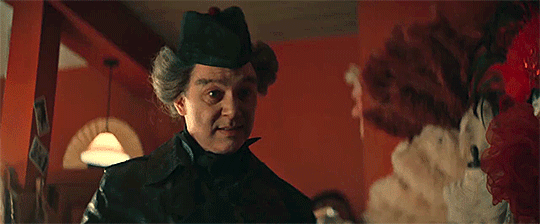

On the surface this incident with Furfur in the dressing room at the Windmill Theater adds weight to the appearance that Crowley has holes in his memory, just like Gabriel does during S2. But a closer look at the language being used during the post-magic show scene actually reveals quite the opposite - something that is - well, I shouldn't say totally unexpected because I've written about it tangentially before - but something that I think will shake up the way we view things between the three of them.
Firstly, lets review what I call the sub-story theme running underneath this section of the episode: King Arthur and Camelot. I talked about it length in my meta Once and Future Royalty. Here's the important paragraphs from that work for this particular meta:

Yes, poor old Furfur. Two's company, three's a crowd, as they say. Now we know we're in Camelot, we need to be reminded of the central tragedy of the Arthurian story, that ultimately led to the golden kingdom's fall. Lady Guinevere, Arthur's queen, famously loved Sir Lancelot, and the two were passionate lovers. It was essentially a love-triangle at the top, with Arthur being jilted, but he wouldn't/couldn't discard his queen. Where do we see this playing out in 1941?
Furfur, pleased with himself for catching an angel and a demon in the act of consorting together (with the help of the zombies,) barges into the backstage dressing room, and confronts the lovers with their crime. But who is playing who in the Arthurian love triangle? I would say Furfur is clearly caught in the role of Arthur here. Consider the following exchange:
[See GIFs at top - I will quote relevant script shortly in detail]
Furfur claims a past intimate relationship with Crowley, which Crowley spurns offhandedly. Crowley is playing Guinevere here, jilting Furfur/Arthur, which leaves the demon-smiting Aziraphale standing in for the handsome hero Lancelot (with his French connections, no less), and doesn't he make us weak at the knees when he drops his voice an octave in dominating disgust. (Is it suddenly getting hot in here...?Phew!)
Recently someone posted more images of Furfur's costume, and the sash was shown reversed, where a red crown can clearly be seen under the stag's head, which to me just adds weight to the Furfur=Arthur role.
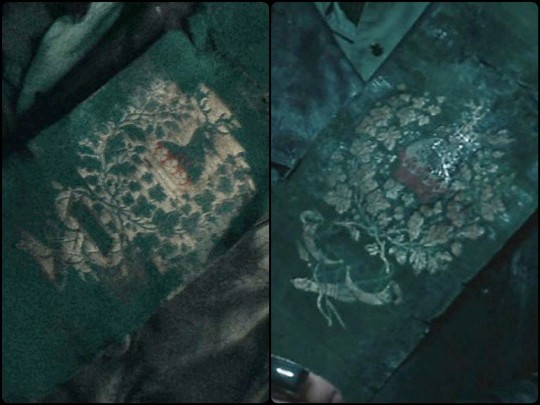
Next we need to take another look at this line from Furfur:
FURFUR: I was right next to you. We did loads together. You used to jump on me back, little monkey in the waistcoat.
Everyone took this too literally.
Really.
I mean really really.
There are two things - ok, three things - this set of lines tells us.
The first is the most obvious and likely the surface impression - maybe Crowley did turn himself into a monkey. But this is a misdirection to the real information here, so forget that. Put it to one side for the moment, at least.
Secondly, Furfur had a "monkey on his back."
We see by this turn of phrase that he was burdened by a problem, or something he couldn't let go of, and in this situation it clearly looks like a long held bitter feeling towards Crowley and his apparent freedom on Earth.
CROWLEY: Oh, we shan't, this is ridiculous. [leans back and puts hat over his face]
FURFUR: No, what's ridiculous is demons like you doing what they please. And somehow still getting on, while demons like me graft for hundreds and hundreds of millennia and never get a sniff of a promotion! Well, not this time. Expect a Legion to come for you first thing tomorrow. Enjoy your last night on Earth.
Thirdly, the whole thing indicates there is a past history of "monkey business" between Furfur and Crowley, before the Fall. This is further emphasized by Furfur's greeting on arrival:
FURFUR: Hmm, well, well, well... What have we here?
AZIRAPHALE: Sorry, have we met?
FURFUR: Oh, no, you never had the pleasure, but... we have, haven't we?
CROWLEY: Have we?
Ohhhh, Crowley. o_0 No, no, no, no, nooooooo..........
Can you see it? Can you see why he would deny knowing Furfur? That they did "loads together?"
Do you know what "monkey business" is an alternative phrase for?
Remember the Arthur/Guinevere/Lancelot love triangle?
Do you think Crowley is going to admit this in front of his angel?
Uh huh.
Really. Really really.
An "unreliable narrator" indeed.
#good omens#good omens 2#good omens meta#crowley#aziraphale#furfur#good omens 1941#1941 minisode#good omens after dark#goad#smut war#ineffable smut war#monkey business#monkey on your back#king arthur#camelot#you'll never look at that scene the same way again#bring on 1941 part III
66 notes
·
View notes
Text
Displays of affection I think would fit Aziraphale and Crowley's canon relationship and characterization (Part V):
Part I here
Part II here
Part III here
Part IV here
Aziraphale booking a photoshoot for him and Crowley so they have more photos than the one from 1941 together. Crowley of course grumbles but you know he puts on his best outfit and holds all the props Aziraphale hands him, and talks his angel up when Aziraphale isn't sure he can pull off certain poses (yes, I am writing a fic about this, be patient my darlings)

Aziraphale complementing Crowley when he changes his outfit or hair. Crowley casually explains it away ("fashion's changing angel") but if you look closely you can see him blushing a bit.

Aziraphale bringing Crowley a coffee from the shops and surprising him with it when he wakes up from a nap on the couch.

Aziraphale planning an elaborate picnic for them and handing Crowley the picnic basket, which he of course carries ("what did you pack in here angel, rocks?") Crowley miracles the grass dry secretly when it's clear the Azitaphale didn't consider the heavy rain the day before made it soggy.

Aziraphale buying an antique upright piano because he "wants to learn the hard way" but really he secretly just wants to hear Crowley play bebop on it when he thinks the angel isn't listening (Crowley is quite good at it of course)

Crowley sees a vintage book on magic tricks while browsing the antique shops for cursed objects, and buys it for Aziraphale. When he gives it to him, Aziraphale is delighted. He doesn't tell the demon he already has a copy.

Because y'all asked so nicely for more. Feel free to use any of this as fic inspo ofc!
#goobers#truly#good omens#aziracrow#aziraphale#crowley#ineffable husbands#aziraphale my beloved#crowley my beloved#i love them your honor
62 notes
·
View notes
Text
Dr. Mid-Nite
Content Warnings: Drugging
Summary: Brief character summaries of Dr. Charles McNider and Dr. Pieter Cross
Comic Issues Involved: Dr. Mid-Nite by Matt Wagner and John K. Snyder III, Hawkman 2002-2006 issue 23-25 by Geoff Johns and Rags Morales, JSA 1999-2006, JSA: Classified 2005-2008, Justice Society of America 2007-2011

There have been 3 characters to use the name Dr. Mid-Nite. The first was Dr. Charles McNider, Dr. Beth Chapel was the second, and the third and current Dr. Mid-Nite is Pieter Cross. Now, since Beth Chapel was with Infinity Inc and not an iteration of the JSA, she’ll probably eventually get her own post. Part of the reason I am also delaying her post is because she’s a main character of Stargirl and I don’t want to walk into spoiler territory.
We will start with Charles McNider and then we will move to Pieter Cross. I love them both and they can both be in the same post for reasons you will discover.
Charles and his nurse/assistant Myra Mason had been working on a new anti-viral serum when the police knocked on his office door. McNider was told that a known gangster named Killer Maroni had attempted to assassinate a key witness and that the witness needed emergency treatment. McNider rushed over to treat the witness, and while he was operating, a thug named Mike threw a hand grenade through the window, killing everyone except McNider. Glass exploded into his eyes, permanently robbing of his sight.
McNider put himself into an intense therapy program and found that he developed more energy at night. This led to him spending several evenings practicing gymnastics and working out. During all of this, Myra ended up falling in love with him.
Since he was no longer able to practice medicine, he turned to writing determined to expose the criminal underworld. Including targeting Killer Maroni.
One night, an owl crashed into his study, causing McNider to take off the bandages on his eyes. He discovered that he could see perfectly in the dark. He turned on the lights and found himself blinded again. When he turned off the light switch, he was able to treat the owl whom he named Hootie.
With his new night vision, he made a costume and started to deal with crime more directly as Dr. Mid-Nite.

Now, Charles is interesting for a variety of reasons, but the one I want to focus on is the fact that there was a very popular theory that he was gay. Charles and Myra, despite having many storylines together and despite Myra being madly in love with him never date. They never pursue a romantic relationship. The line that is often quoted is as follows “She had love for me. It was a love doomed from the start… but I could never quite bring myself to tell her.” In an interview with one of the writers, it was cleared up that it was his dual life not him being gay. This makes sense and would fall in line with some of who Charles is but it doesn’t quite ring true (sure the official writer came out and said it but I Strongly Disagree With The Writer). Refer to the fact that Charles became a hero in 1941, held a respectable position as a surgeon, was a Captain in the Army during World War 2, and was in a mostly all-boys club also known as the All-Star Squadron and later the Justice Society of America. Yes, you can make the argument that the comics are sexist and blah blah blah- The only female members ever of the JSA for a while were Hippolyta, Dinah Drake, and Kara Zor-El. Not all at the same time.
Charles is very dedicated to his work, he knows the JSA well, and he knows Theodore Knight (He will get his own post in time), the first Starman, well enough that when Ted had a mental breakdown as he dealt with the implications of his involvement in the Manhattan project that he took up the mantle of Starman.
So, Charles McNider- A man who is too focused on his dual life to date Myra, a woman he has known for years, hangs up his costume to take on a friend’s costume until he recovers? As favors go, that’s a pretty big one. And it’s not one to take up lightly in light of Charles’s blindness without infrared goggles. Now I’ve mentioned that Charles said he never considered telling Myra his secret identity, yet he cares enough about Ted’s mental health that he took on the name Starman. I rest my case.
Charles is also on the record of saying that he doesn’t like the effects of Rex Tyler’s Miraclo and that he thinks it’s dangerous. He cares about the health of his teammates and friends.
I said earlier that Charles had some connection to Pieter Cross, and he does! The first time Charles met Pieter, he actually delivered him! Charles McNider, one of the few mentors who can say that he literally brought his protégé into the world. Charles would later go on to train both Beth Chapel and Pieter Cross.
Pieter Cross is an absolutely brilliant man, he graduated from Harvard at 19 and immigrated to America from Norway.

At some point, he moved to Portsmouth City, Oregon, and began to investigate A39, a drug derived from Venom (not the alien goo, the stuff Bane takes). Pieter found out that it was being produced by Paraeda Industries. To try to silence him, they had him knocked out and injected with A39 before putting him behind the wheel of a car. He woke up just as the car struck and killed a woman. The drug left him blind to normal light but able to see in the dark just fine.

He eventually ended up joining the JSA, specifically around the time that Todd Rice aka Obsidian aka Alan Scott’s son seemed to become a supervillain (Todd will also be getting his own post at some point). He had a short-lived relationship with Dinah Lance. You know what relationship isn’t short-lived? His friendship with the current Mr. Terrific, Michael Holt. The two play scrabble frequently together and have a very solid friendship.
Pieter Cross is devoutly Christian and Michael is a staunch atheist (this is only ironic because of how Michael ended up becoming Mr. Terrific. Different Post for a different time). They have had many genuine conversations about faith, and what I’m about to say is vitally important- Pieter has never once forced his beliefs onto Michael.

More facts about Pieter? Pieter runs a website as Dr. Mid-Nite where he provides free medical advice to registered users. He supports Sex Workers and treats them with dignity and respect, he runs a free clinic in Portsmouth to treat people, he runs a needle exchange program. What’s Not To Love About Pieter? Oh- he also developed a sober pill that allows him to drink small amounts of alcohol and not become inebriated. His owl is named Charlie after Charles McNider. When the JSA and JLA had thanksgiving together, he volunteered for monitor duty because he didn’t want to see Dinah (and Alan ratted him out). He’s also a vegetarian and he practices yoga.
#DC Comics#Character Analysis#Pieter Cross#Charles McNider#Dr. Mid-Nite#Dr. Charles McNider#Dr. Pieter Cross#tw: drugging#cw: drugging
21 notes
·
View notes
Text
MEET THE PRESS
August 3, 1969
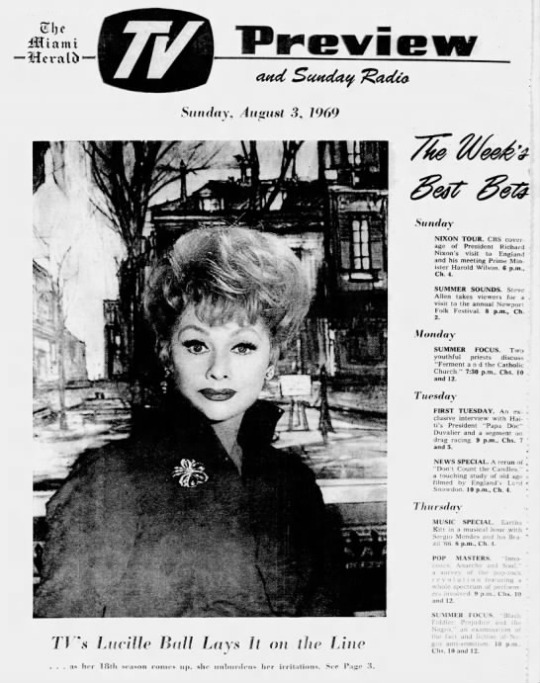
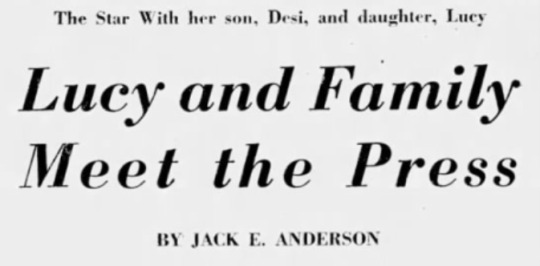
You are clued into the frank and tough talk to come by the way Lucille Ball swipes away with her handkerchief at the flies threatening the hors d’oeuvres The kerchief almost snaps like a wet towel.
The scene is the pool patio of her home on Beverly Hills’ Roxbury Drive and a cocktail party is in progress for visiting television editors.
Lucy has just emerged from the main house. She wears a powder blue double-breasted slack suit and saucer-sized sun glasses. In the blazing sun her orange hair has the color intensity of hot coals.
She has counted heads. Husband-producer Gary Morton is there. So are Desi Arnaz IV her son, and Lucy her daughter. And her TV side-kick Gale Gordon with his wife. Plus a half-dozen of her staff and CBS emissaries. There have been introductions all round to the newspaper types. It is time, she announces, to talk and she waves everybody into the big and comfortable pool house. A table has been positioned so that she can sit there presiding as she used to do at the stockholders’ meetings of the old Desilu Studios.
Almost immediately some wag fields her the question: “Lucy do you run the show?” She flashes him that big innocent TV look of hers. A staff member jumps up “Let’s all answer that one for her” There is a resounding “YES” from family-and-cast. Everybody laughs uproariously.
Very few questions are required to prime the pump. Lucy, it seems, has some matters of personal irritation on her mind and as far as she is concerned they come tumbling out without any prodding from her would-be interrogators.
First of all, she asks rhetorically, what’s all this business about whether she would retire? “I never said I wanted to quit or retire. There was a time when I was willing to quit but nobody asked me. Now I’ve set a date when I’ll retire”
A lot of ears perk up Somebody asks slyly — when? She’s waiting for that. Her answer is smilingly emphatic: “When I drop dead in my tracks.”
She turns then without anybody’s questioning to the matter of her longevity in television. This is her 18th year on the tube and it used to be talked about that she traded her popularity to CBS in return for its buying other shows produced by her company. This evokes an almost visible jet of steam out of the top of her carrot locks. “I never at any time sold any of the 20 shows our company produced on the basis of my returning each season. I’ve said that literally hundreds of times and nobody believed it.”
She went on to make it clear that she also dislikes the “big business” image which has adhered to her over the years. “I never like to talk about big money. I make my deal and that’s all. It’s been mostly a matter of legal procedures.”

As the star wades into these fiscal subjects your eye roams over the assemblage. Young Desi in tennis togs impassively studies the smoke curling up from a cigarette. Young Lucy clutches her hands around her knees and stares intently at her mother. Husband Gary sitting on a ledge at the back of the room swings his legs and smiles.
There has been no mention of Desi the elder the former husband Lucy’s co-performer and co-founder of Desilu Studios (now sold). Earlier this writer had chatted briefly with young Desi. He said he saw his father off and on and spends his summers as a rule at the father’s beach home at Delmar, south of Los Angeles.
The youngster asked if I knew his grandfather Dr. Desiderio Arnaz who lives in Coral Gables. (1)
But back to Lucy She’s telling us how many years it took to realize that as Lucille Ball she had attained V.I.P. status.
She reviews the years she spent trying to make it in show business, first on the stage, then as a model, and finally in the movies. Much of the time she says she stagnated. Until television came along.
“I never had any sense of importance. I was very pliable always willing to do what I was told It wasn’t until one day I saw in print somewhere some actress described as a ‘Lucille Ball type’ that I knew suddenly I was somebody and a part of the business.”
From there on the interview jumps from subject to subject.
I ask her whatever happened to the project Dean Martin’s producer Greg Garrison had for starring Martin, her, and Jackie Gleason in a revival of the musical “Guys and Dolls.” (2)
“I never said I would do it. Garrison kept publicizing it, but he never cleared it with me. I do still want to do ‘Diamond Jim’ with Jackie It’s just a matter of finding the time.” (3)
A lady editor wants to know how Lucy keeps her sinuous figure.
“I don’t particularly like food. I’m not very fond of meat, for example, except in the morning.”
Which brings a snort of disgust from her husband. “Can you imagine what it’s like to have to watch her eating corned beef or hamburger at 6 o’clock in the morning?”
The questions now go to the children. What are Desi’s plans? Does he want to make acting his future? “I want to be an actor for awhile but I don’t think I ever want to be one certain thing.”
Young Lucy, who, at 18, is two years older than her brother, is more sure of her future “I’ll go to college for awhile but I like acting. I’ll stay at it if I can.”
Would she somebody asks join the campus protest and carry a sign? Only if it says ‘wet paint’ quips she.
Lucy now introduces her cast veteran, Gale Gordon. He pays her extravagant compliments and talks a bit about his radio and early television days.
The interview’s late arrival is venerable George Marshall, who is now the show’s director. Lucy introduces him as “our sexy senior citizen.” Marshall goes back to the dawn of movies and is filled with fascinating anecdotes about his years in the business. (4)
The conversation turns to TV’s talk shows. Somebody suggests to Lucy that she would be a highly likely guest for Merv Griffin’s new show starting on CBS Aug 18. (5)
Lucy's answer comes lancing back “That’s what you think. I don’t like him.” Which rocks everybody back. Why not? “Because he doesn’t know how to interview. He’s rude to his guests and he monopolizes the conversation.”
She doesn’t wait for the next question. “I’m wild about Dick Cavett (on ABC) I think he’s great And I told Bill Paley (board chairman of CBS) he should have him on our network. But Bill said ABC got him first and we’re out of luck.” (6)
Everybody is suddenly distracted by three teen-age girl fans leaning over a fence way up front. They’re begging to be allowed on the grounds. Morton jogs forward to shoo them away.
“This happens all the time,” says Lucy. “My God they used to picnic right in front of the house until our police department stopped them. Jimmy Stewart, who lives up the street, finally told me how to keep them away. Turn on the lawn sprinklers.”
Morton returns and takes everybody for a tour of their luxurious but very lived-in home. Lucy tells us a funny story about how Jack and Mary Benny had once been their next door neighbors sold their home then asked her to try to mediate a re-sale of the place back to them. Then we take our leave.
# # #
FOOTNOTES FROM THE FUTURE

(1) Dr. Desiderio Alberto Arnaz y Alberni II (1894-1973) was a Cuban politician and the father of Desi Arnaz. He graduated from the Southern College of Pharmacy in 1913 in Atlanta, Georgia. Desiderio Arnaz II was the youngest mayor of Santiago de Cuba (1923–32). When president Machado was overthrown in August 1933, Arnaz was arrested and jailed. Six months later, he was allowed to go into exile. He married Dolores "Lolita" de Acha y de Socias in 1916 and had one son, Desiderio "Desi" Arnaz III. He later had a daughter, Connie Arnaz (1932), with Anne M. Wilson, whom he married in 1941.

(2) Guys & Dolls was a 1950 stage musical by Frank Loesser, based on the stories by Damon Runyon starring Robert Alda, who appeared on several episodes of “The Lucy Show” and “Here’s Lucy”. It was filmed by MGM in 1955. During that time, Lucy and Desi were also under contract to MGM, so they prevailed upon “I Love Lucy” to insert a clip from the film into “Lucy and the Dummy” (ILL S5;E3). After its initial airing on October 17, 1955, the clip was removed from the film print, and for legal reasons, has never been restored. It is unclear whether Garrison’s project with Martin, Ball, and Gleason would have been a film revival, or a stage production. Whatever it was to be, Lucy wanted to have no part of it, perhaps remembering the rigors of performing on stage in Wildcat (1960). During her film career, Ball was in two films based on Damon Runyon material, The Big Street (1942), a film she claimed as her favorite, and Sorrowful Jones (1949). She also did a radio version of Runyon’s “Tight Shoes” in 1942. Ball and Gleason would have been cast as Miss Adelaide and Nathan Detroit, while Dean Martin would have played Sky Masterson, the romantic lead. Those roles were played by Vivian Blaine, Frank Sinatra, and Marlon Brando in the film. Obviously, the project never came to be.
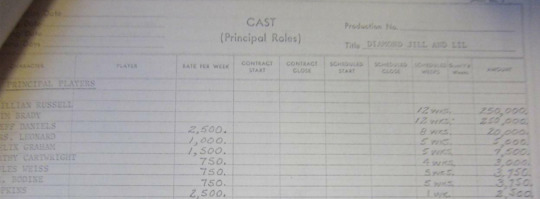
(3) “Diamond Jim” was a project that Lucy dearly wanted to make with Gleason. He would play Diamond Jim Brady (1856-1917) to her Lillian Russell. Ball even went so far as to have a script written to further grab Gleason’s attention. Despite their best intentions, Gleason and Ball’s schedules never allowed for enough time to make the film.
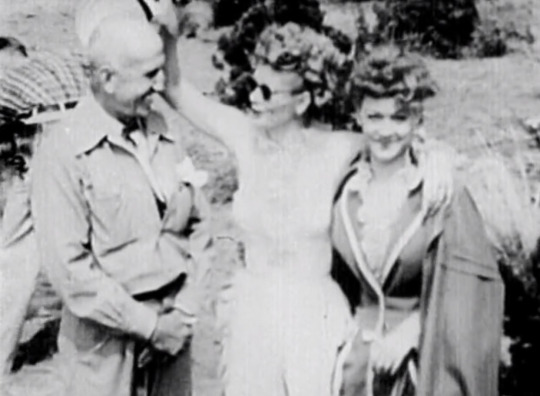
(4) George Marshall (1891-1975) had directed Lucille Ball in Valley of the Sun (1942) and Fancy Pants (1950). He was considered an expert at location shooting, so when “Here’s Lucy” wanted to spend the first four episodes of Season 2 on location, Marshall was hired as director. He stayed on for seven more episodes of the sitcom before bowing out.
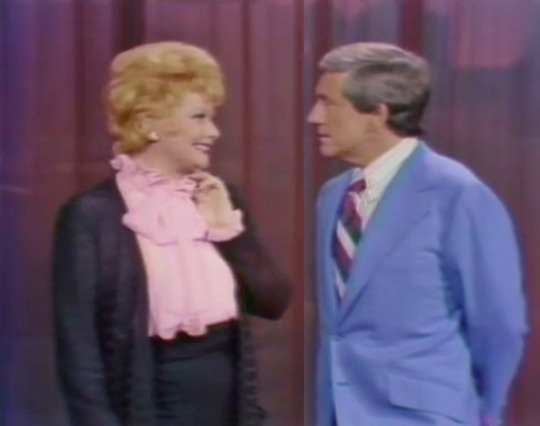
(5) Despite Lucille Ball’s rather harsh public assessment of Merv Griffin (1925-2007) at this August 1969 press party, Ball appeared on “The Merv Griffin Show” four times between 1971 and 1980! During her first appearance, the aforementioned George Marshall was also a guest!

(6) Lucille did seem to enjoy doing the talking to Dick Cavett, although she only got to do his chat show once, on March 7, 1974, in conjunction with her press tour for Mame.
#Lucille Ball#1969#Press Party#Dick Cavett#Merv Griffin#TV#Here's Lucy#Gary Morton#Lucie Arnaz#Desi Arnaz Jr.#Guys and Dolls#George Marshall#Jack E. Anderson
4 notes
·
View notes
Text
Nixon’s mother was an awesome lady!
When I was googling background info about Lewis Nixon, I came across the the wikipedia pages of his parents
(BTW, it amazed me that Nixon’s grandfather, father and mother all have their own wikipedia pages).
Nixon’s father appears to be a horrible and violent person.
However, his mother was quite an accomplished woman:
Doris Ryer Nixon founded the California chapter of American Women's Voluntary Services (AWVS) in August 1941 and was eventually elected national vice-president of the AWVS.
(She might be the only one in Nixon’s family who supported Nixon to join up the army)
She was the founder and president of Guide Dogs for the Blind, Inc., state commander of the California Cancer Society
(I wonder why Nixon was such a dog person!)
Back then ppl were wondering what in the world could an angel like Doris see in someone like Stanhope? (Maybe in 1917 rich ppl didn’t marry for love)
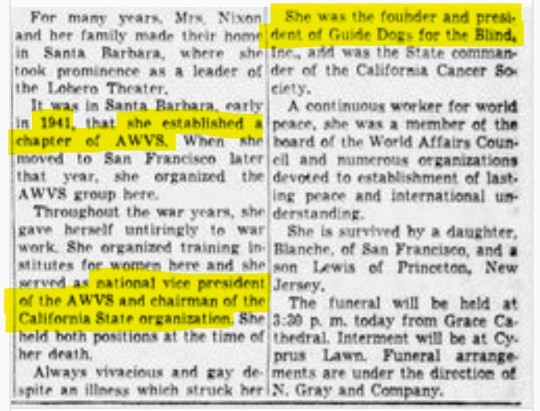
Dick definitely has met her for at least once. In 1945, after her divorce with Stanhope, she was hospitalised in New York. Nixon called Dick to come to New York for the job, and took him to see his mother for the first time. Winters was all dressed up in his dress uniform.
<Biggest brother>:
“Winters got out his dress uniform and had it pressed. He polished the brass buttons and shined his jump boots.” ....
"She was very very nice and pleasant", he (Dick)recalled, “I can remember her very definitely trying to say nice things, the right things, like 'I've heard a lot of good stories about you' and so forth”
Doris Nixon has a large fortune under her own name. When she passed away in 1948, she left 1.4 million to split equally between her two children Lewis and Blanche (including 6,600 acres of farm in California)
That was a huge amount of money.
In comparison, Dick saved $10,000 during his entire time in the army (and he used $7,000 to help his parents to pay off the mortgage of the their family home). (paratrooper were considered well-paid by common standard).
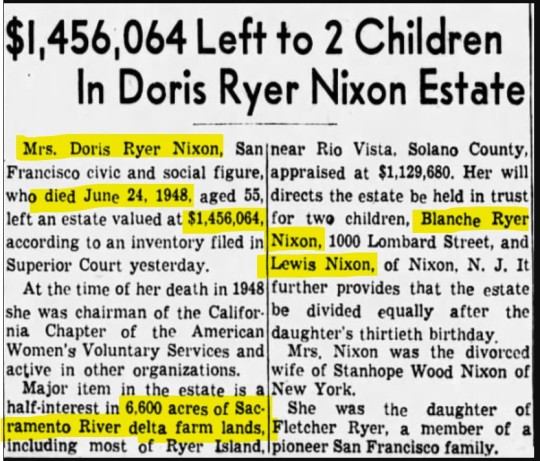
Oh, her Wikipedia page cracks me up because in a subtle way it throws shades at Lewis in the last paragraph XD
The webpage went on and on through her “Ancestry” “ Debutante”, “ Marriage and family “ “ Civic leadership “, BLA BLA BLA BLA, at the end in a tiny paragraph it added that
“ Her son, Lewis Nixon III, served as an officer in the 506th Parachute Infantry Regiment, part of it with E Company. His association with E Company would bring him fame after his 1995 death, when the company became the subject of the 2001 television mini-series Band of Brothers based on the Stephen Ambrose book. “
****************************************
In addition, after snooping for gossips studying Nixon’s family background, I sort of get the idea that why Nixon felt like an epic loser in front of his family even when he was a legitimate war hero.
His grandfather was a naval architect, a political activist. In early 1900s, he was received in special audience by Pope Pius, Czar Nicholas II and the King of England.
His grandmother Sally Lewis Wood was the daughter of General L.B. Wood.
Doris Nixon married Stanhope in 1917 and she was given away by the governor of New York.
Both his father and mother own lands bearing their family names (Nixon, and Ryer island)
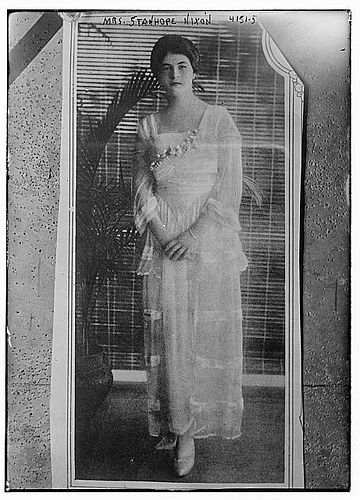
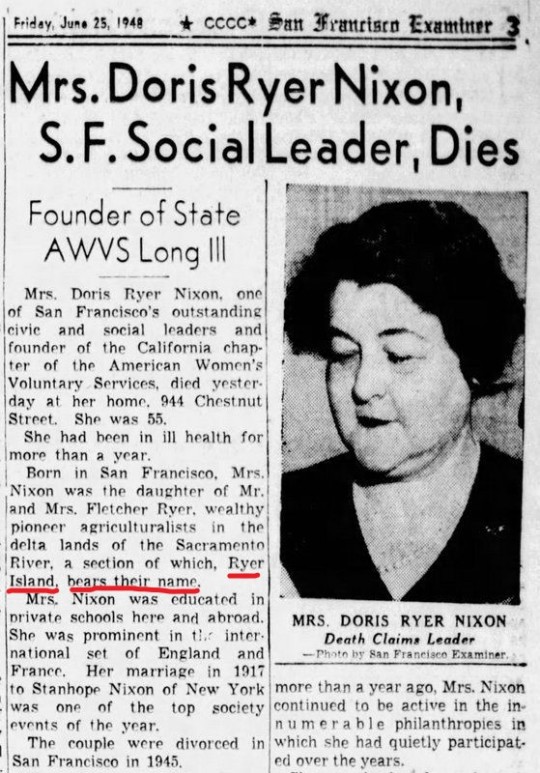
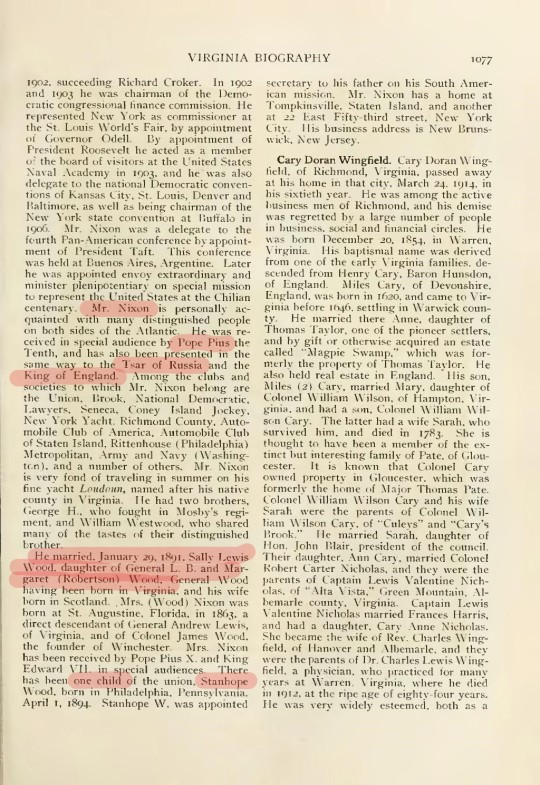
25 notes
·
View notes
Text
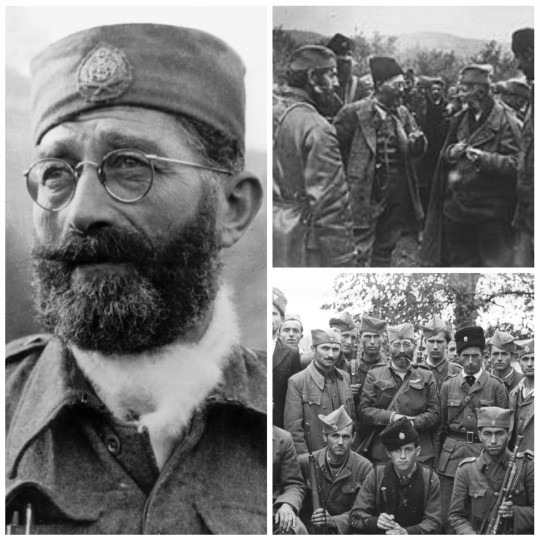
• Draža Mihailović
Dragoljub "Draža" Mihailović was a Yugoslav Serb general during World War II. A staunch royalist, he retreated to the mountains near Belgrade when the Germans overran Yugoslavia in April 1941 and there he organized bands of guerrillas known as the Chetnik Detachments of the Yugoslav Army.
Dragoljub "Draža" Mihailović was born on April 27th, 1893 in Ivanjica, Kingdom of Serbia to Mihailo and Smiljana Mihailović. His father was a court clerk. Orphaned at seven years of age, Mihailović was raised by his paternal uncle in Belgrade. As both of his uncles were military officers, Mihailović himself joined the Serbian Military Academy in October 1910. He fought as a cadet in the Serbian Army during the Balkan Wars of 1912–13 and was awarded the Silver Medal of Valor at the end of the First Balkan War, in May 1913. At the end of the Second Balkan War, during which he mainly led operations along the Albanian border, he was given the rank of second lieutenant as the top soldier in his class, ranked sixth at the Serbian military academy. He served in World War I and was involved in the Serbian Army's retreat through Albania in 1915. He later received several decorations for his achievements on the Salonika Front. Following the war, he became a member of the Royal Guard of the Kingdom of Serbs, Croats and Slovenes but had to leave his position in 1920 after taking part in a public argument between communist and nationalist sympathizers.
He was subsequently stationed to Skopje. In 1921, he was admitted to the Superior Military Academy of Belgrade. In 1923, having finished his studies, he was promoted as an assistant to the military staff, along with the fifteen other best alumni of his promotion. He was promoted to the rank of lieutenant colonel in 1930. That same year, he spent three months in Paris, following classes at the École spéciale militaire de Saint-Cyr. Some authors claim that he met and befriended Charles de Gaulle during his stay, although there is no known evidence of this. In 1935, he became a military attaché to the Kingdom of Bulgaria and was stationed to Sofia. On September 6th, 1935, he was promoted to the rank of colonel. Mihailović then came in contact with members of Zveno and considered taking part in a plot which aimed to provoke Boris III's abdication and the creation of an alliance between Yugoslavia and Bulgaria, but, being untrained as a spy, he was soon identified by Bulgarian authorities and was asked to leave the country. He was then appointed as an attaché to Czechoslovakia in Prague.
His military career almost came to an abrupt end in 1939, when he submitted a report strongly criticizing the organization of the Royal Yugoslav Army. Among his most important proposals were abandoning the defence of the northern frontier to concentrate forces in the mountainous interior; re-organizing the armed forces into Serb, Croat, and Slovene units in order to better counter subversive activities; and using mobile Chetnik units along the borders. Milan Nedić, the Minister of the Army, was incensed by Mihailović's report and ordered that he be confined to barracks for 30 days. Afterwards, Mihailović became a professor at Belgrade's staff college. In the summer of 1940, he attended a function put on by the British military attaché for the Association of Yugoslav Reserve NCOs. The meeting was seen as highly anti-Nazi in tone, and the German ambassador protested Mihailović's presence. Nedić once more ordered him confined to barracks for 30 days as well as demoted and placed on the retired list. These last punishments were avoided only by Nedić's retirement in November. In the years preceding the Axis invasion of Yugoslavia, Mihailović was stationed in Celje, Drava Banovina (modern Slovenia). At the time of the invasion, Colonel Mihailović was an assistant to the chief-of-staff of the Yugoslav Second Army in northern Bosnia. He briefly served as the Second Army chief-of-staff prior to taking command of a "Rapid Unit" (brzi odred) shortly before the Yugoslav High Command capitulated to the Germans on April 17th, 1941.
Following the invasion and occupation of Yugoslavia by Germany, Italy, Hungary, a small group of officers and soldiers led by Mihailović escaped in the hope of finding Yugoslavian units still fighting in the mountains. After skirmishing with several Ustaše and Muslim bands and attempting to sabotage several objects, Mihailović and about 80 of his men crossed the Drina River into German-occupied Serbia. Mihailović planned to establish an underground intelligence movement and establish contact with the Allies, though it is unclear if he initially envisioned to start an actual armed resistance movement. For the time being, Mihailović established a small nucleus of officers with an armed guard, which he called the "Command of Chetnik Detachments of the Yugoslav Army". After arriving at Ravna Gora in early May 1941, he realized that his group of seven officers and twenty-four non-commissioned officers and soldiers was the only one. He began to draw up lists of conscripts and reservists for possible use. His men at Ravna Gora were joined by a group of civilians, mainly intellectuals from the Serbian Cultural Club, who took charge of the movement's propaganda sector. The Chetniks of Kosta Pećanac, which were already in existence before the invasion, did not share Mihailović's desire for resistance. In order to distinguish his Chetniks from other groups calling themselves Chetniks, Mihailović and his followers identified themselves as the "Ravna Gora movement". The stated goal of the Ravna Gora movement was the liberation of the country from the occupying armies of Germany, Italy and the Ustaše.
Mihailović spent most of 1941 consolidating scattered remnants and finding new recruits. In August, he set up a civilian advisory body, the Central National Committee, composed of Serb political leaders including some with strong nationalist views such as Dragiša Vasić and Stevan Moljević. Mihailović first established radio contact with the British in September 1941, when his radio operator raised a ship in the Mediterranean. On September 13th, Mihailović's first radio message to King Peter's government-in-exile announced that he was organizing Yugoslavia remnants to fight against the Axis powers. Mihailović also received help from officers in other areas of Yugoslavia, such as Slovene officer Rudolf Perinhek, who brought reports on the situation in Montenegro. Mihailović sent him back to Montenegro with written authorization to organize units there. Mihailović's strategy was to avoid direct conflict with the Axis forces, intending to rise up after Allied forces arrived in Yugoslavia. Mihailović's Chetniks had had defensive encounters with the Germans, but reprisals and the tales of the massacres in the Axis puppet state of Croatia made them reluctant to engage directly in armed struggle, except against the Ustaše in Serbian border areas. By the end of August, Mihailović's Chetniks and Josep "Tito" Broz's Partisans began attacking Axis forces, sometimes jointly despite their mutual diffidence, and captured numerous prisoners. On October 28th, 1941 Mihailović received an order from the Prime Minister of the Yugoslav Government in exile Dušan Simović who urged Mihailović to avoid premature actions and avoid German reprisals. Mihailović discouraged sabotage due to German reprisals (such as more than 3,000 killed in Kraljevo and Kragujevac) unless some great gain could be accomplished. Instead, he favoured sabotage that could not easily be traced back to the Chetniks. His reluctance to engage in more active resistance meant that most sabotage carried out in the early period of the war were due to efforts by the Partisans, and Mihailović lost several commanders and a number of followers who wished to fight the Germans to the Partisan movement.
Even though Mihailović initially asked for discreet support, propaganda from the British and from the Yugoslav government-in-exile quickly began to exalt his feats. The creation of a resistance movement in occupied Europe was received as a morale booster. Mihailović soon realized that his men did not have the means to protect Serbian civilians against German reprisals. The prospect of reprisals also fed Chetnik concerns regarding a possible takeover of Yugoslavia by the Partisans after the war, and they did not wish to engage in actions that might ultimately result in a post-war Serb minority. Mihailović's strategy was to bring together the various Serb bands and build an organization capable of seizing power after the Axis withdrew or were defeated, rather than engaging in direct confrontation with them. In contrast to the reluctance of Chetnik leaders to directly engage the Axis forces, the Partisans advocated open resistance, which appealed to those Chetniks desiring to fight the occupation. On September 19th, 1941, Tito met with Mihailović to negotiate an alliance between the Partisans and Chetniks, but they failed to reach an agreement as the disparity of the aims of their respective movements was great enough to preclude any real compromise. In mid-November, the Germans launched an offensive against the Partisans, Operation Western Morava, which bypassed Chetnik forces. Having been unable to quickly overcome the Chetniks, faced with reports that the British considered Mihailović as the leader of the resistance, and under pressure from the German offensive, Tito approached Mihailović with an offer to negotiate, which resulted in talks and later an armistice between the two groups on November 21st. Mihailović did not resume radio transmissions with the Allies before January 1942. In early 1942, the Yugoslav government-in-exile reorganized and appointed Slobodan Jovanović as prime minister, and the cabinet declared the strengthening of Mihailović's position as one of its primary goals. On January 11th, Mihailović was named "Minister of the Army, Navy and Air Forces" by the government-in-exile.
In Montenegro, Mihailović found a complex situation. The local Chetnik leaders, Bajo Stanišić and Pavle Đurišić, had reached arrangements with the Italians and were cooperating with them against the communist-led Partisans. Mihailović later claimed at his trial in 1946 that he was unaware of these arrangements prior to his arrival in Montenegro, and had to accept them once he arrived. Mihailović believed that Italian military intelligence was better informed than he was of the activities of his commanders. He tried to make the best of the situation and accepted the appointment of Blažo Đukanović as the figurehead commander of "nationalist forces" in Montenegro. While Mihailović approved the destruction of communist forces, he aimed to exploit the connections of Chetniks commanders with the Italians to get food, arms and ammunition in the expectation of an Allied landing in the Balkans. Having become more and more concerned with domestic enemies and concerned that he be in a position to control Yugoslavia after the Allies defeated the Axis, Mihailović concentrated from Montenegro on directing operations, in the various parts of Yugoslavia, mostly against Partisans, but also against the Ustaše and Dimitrije Ljotić's Serbian Volunteer Corps (SDK). During the autumn of 1942, Mihailović's Chetniks at the request of the British organization sabotaged several railway lines used to supply Axis forces in the Western Desert of northern Africa. Adolf Hitler wrote to Benito Mussolini on February 16th, 1943, demanding that in addition to the partisans be pursued the chetniks who possessed "a special danger in the long-term plans that Mihailovic's supporters were building." Hitler adds: "In any case, the liquidation of the Mihailovic movement will no longer be an easy task, given the forces at its disposal and the large number of armed Chetniks". From the beginning of 1943, General Mihailovic prepared his units for the supports of Allied landing on the Adriatic coast. General Mihailovic hoped that the Western Alliance would open the Second Front in the Balkans.
Mihailović had great difficulties controlling his local commanders, who often did not have radio contacts and relied on couriers to communicate. He was, however, apparently aware that many Chetnik groups were committing crimes against civilians and acts of ethnic cleansing; according to Pavlowitch, Đurišić proudly reported to Mihailović that he had destroyed Muslim villages, in retribution against acts committed by Muslim militias. While Mihailović apparently did not order such acts himself and disapproved of them, he also failed to take any action against them, being dependent on various armed groups whose policy he could neither denounce nor condone. Many terror acts were committed by Chetnik groups against their various enemies, real or perceived, reaching a peak between October 1942 and February 1943. Chetnik ideology encompassed the notion of Greater Serbia, to be achieved by forcing population shifts in order to create ethnically homogeneous areas. Chetniks forces engaged in numerous acts of violence including massacres and destruction of property, and used terror tactics to drive out non-Serb groups. Mihailović was certainly aware of both the ideological goal of cleansing and of the violent acts taken to accomplish that goal. In November 1942, Captain Hudson cabled to Cairo that the situation was problematic, that opportunities for large-scale sabotage were not exploited because of Mihailović's willingness to avoid reprisals and that, while waiting for an Allied landing and victory, the Chetnik leader might come to "any sound understanding with either Italians or Germans which he believed might serve his purposes without compromising him", in order to defeat the communists. A British senior officer, Colonel S. W. Bailey, was then sent to Mihailović and was parachuted into Montenegro on Christmas Day. His mission was to gather information and to see if Mihailović had carried out necessary sabotages against railroads. During the following months, the British concentrated on having Mihailović stop Chetnik collaboration with Axis forces and perform the expected actions against the occupiers, but they were not successful. In January 1943, the SOE reported to Churchill that Mihailović's subordinate commanders had made local arrangements with Italian authorities, although there was no evidence that Mihailović himself had ever dealt with the Germans. Bailey reported that Mihailović was increasingly dissatisfied with the insufficient help he was receiving from the British. Mihailović's movement had been so inflated by British propaganda that the liaison officers found the reality decidedly below expectations.
On February 28th, 1943, in Bailey's presence, Mihailović addressed his troops in Lipovo. Bailey reported that Mihailović had expressed his bitterness over "perfidious Albion" who expected the Serbs to fight to the last drop of blood without giving them any means to do so, had said that the Serbs were completely friendless, that the British were holding King Peter II and his government as virtual prisoners, and that he would keep accepting help from the Italians as long as it would give him the means to annihilate the Partisans. The British officially protested to the Yugoslav government-in-exile and demanded explanations regarding Mihailović's attitude and collaboration with the Italians. Mihailović answered to his government that he had had no meetings with Italian generals. Also in early 1943, the tone of the BBC broadcasts became more and more favourable to the Partisans, describing them as the only resistance movement in Yugoslavia, and occasionally attributing to them resistance acts actually undertaken by the Chetniks. During the Allied invasion of Italy the Italians heavily supported the Chetniks in the hope that they would deal a fatal blow to the Partisans. The Germans disapproved of this collaboration, about which Hitler personally wrote to Mussolini. At the end of February, shortly after his speech, Mihailović himself joined his troops in Herzegovina near the Neretva in order to try to salvage the situation. The Partisans nevertheless defeated the opposing Chetniks troops, who were in a state of disarray, and managed to go across the Neretva. In March, the Partisans negotiated a truce with Axis forces in order to gain some time and use it to defeat the Chetniks. While Ribbentrop and Hitler finally overruled the orders of their subordinates and forbade any such contacts, the Partisans benefited from this brief truce, during which Italian support for the Chetniks was suspended, and which allowed Tito's forces to deal a severe blow to Mihailović's troops. In late May, after regaining control of most of Montenegro, the Italians turned their efforts against the Chetniks, at least against Mihailović's forces, and put a reward of half-a-million lire for the capture of Mihailović, and one million for the capture of Tito.
In April and May 1943, the British sent a mission to the Partisans and strengthened their mission to the Chetniks. Mihailović returned to Serbia and his movement rapidly recovered its dominance in the region. Receiving more weapons from the British, he undertook a series of actions and sabotages, disarmed Serbian State Guard (SDS) detachments and skirmished with Bulgarian troops, though he generally avoided the Germans, considering that his troops were not yet strong enough. In Serbia, his organization controlled the mountains where Axis forces were absent. The United States sent liaison officers to join Bailey's mission with Mihailović, while also sending men to Tito. The Germans, in the meantime, became worried by the growing strength of the Partisans and made local arrangements with Chetnik groups, though not with Mihailović himself. From the beginning of 1943, British impatience with Mihailović grew. From the decrypts of German wireless messages, Churchill and his government concluded that the Chetniks' collaboration with the Italians went beyond what was acceptable and that the Partisans were doing the most severe damage to the Axis. By November and December 1943, the Germans had realized that Tito was their most dangerous opponent. At the end of October, the local signals decrypted in Cairo had disclosed that Mihailović had ordered all Chetnik units to co-operate with Germany against the Partisans. The British were more and more concerned about the fact that the Chetniks were more willing to fight Partisans than Axis troops. At the third Moscow Conference in October 1943, Anthony Eden expressed impatience about Mihailović's lack of action. The report of Fitzroy Maclean, liaison officer to the Partisans, convinced Churchill that Tito's forces were the most reliable resistance group. On December 10th, Churchill met King Peter II in London and told him that he possessed irrefutable proofs of Mihailović's collaboration with the enemy and that Mihailović should be eliminated from the Yugoslav cabinet. Also in early December, Mihailović was asked to undertake an important sabotage mission against railways, which was later interpreted as a "final opportunity" to redeem himself. However, possibly not realizing how Allied policy had evolved, he failed to give the go-ahead. This hastened the British's decision to withdraw their thirty liaison officers to Mihailović. The mission was effectively withdrawn in the spring of 1944.
At the end of August 1944, the Soviet Union's Red Army arrived on the eastern borders of Yugoslavia. In early September, it invaded Bulgaria and coerced it into turning against the Axis. Mihailović's Chetniks, meanwhile, were so badly armed to resist the Partisan incursions into Serbia that some of Mihailović's officers, including Nikola Kalabić, Neško Nedić and Dragoslav Račić, met German officers in August to arrange a meeting of Mihailović with Neubacher and to set forth the conditions for increased collaboration. From the existing accounts, they met in a dark room and Mihailović remained mostly silent, so much so that Nedić was not even sure afterwards that he had actually met the real Mihailović. According to British official Stephen Clissold, Mihailović was initially very reluctant to go to the meeting, but was finally convinced by Kalabić. It appears that Nedić offered to obtain arms from the Germans, and to place his Serbian State Guard under Mihailović's command, possibly as part of an attempt to switch sides as Germany was losing the war. Neubacher favoured the idea, but it was vetoed by Hitler, who saw this as an attempt to establish an "English fifth column" in Serbia. As the Red Army approached, Mihailović thought that the outcome of war would depend on Turkey entering the conflict, followed at last by an Allied incursion in the Balkans. He called upon all Yugoslavs to remain faithful to the King, and claimed that Peter had sent him a message telling him not to believe what he had heard on the radio about his dismissal. His troops started to break up outside Serbia in mid-August, as he tried to reach to Muslim and Croat leaders for a national uprising. Mihailović ordered a general mobilization on September 1st; his troops were engaged against the Germans and the Bulgarians, while also under attack by the Partisans. German sources confirm the loyalty of Mihailović and forces under his direct influence in this period. Mihailović's movement collapsed in Serbia under the attacks of Soviets, Partisans, Bulgarians and fighting with the retreating Germans. Still hoping for a landing by the Western Allies, he headed for Bosnia with his staff, McDowell and a force of a few hundred. He set up a few Muslim units and appointed Croat Major Matija Parac as the head of an as yet non-existent Croatian Chetnik army. Nedić himself had fled to Austria. On May 25th, 1945, he wrote to General Dwight D. Eisenhower, asserting that he had always been a secret ally of Mihailović. Now hoping for support from the United States, Mihailović met a small British mission between the Neretva river and Dubrovnik, but realized that it wasn't the signal of the hoped-for landing. McDowell was evacuated on 1 November and was instructed to offer Mihailović the opportunity to leave with him. Mihailović refused, as he wanted to remain until the expected change of Western Allied policy.
With their main forces in eastern Bosnia, the Chetniks under Mihailović's personal command in the late months of 1944 continued to collaborate with Germans. In January 1945, Mihailović tried to regroup his forces on the Ozren heights, planning Muslim, Croatian and Slovenian units. His troops were, however, decimated and worn out, some selling their weapons and ammunition, or pillaging the local population. In April, Mihailović set out for northern Bosnia, on a 280 km-long march back to Serbia, aiming to start over a resistance movement, this time against the communists. His units were decimated by clashes with the Ustaše and Partisans, as well as dissension and typhus. In May, they were attacked and defeated by Yugoslav People's Army (JNA), the successor to the Partisans, in battle of Zelengora. Mihailović managed to escape with 1,000–2,000 men, who gradually dispersed. Mihailović himself went into hiding in the mountains with a handful of men. The Yugoslav authorities wanted to catch Mihailović alive in order to stage a full-scale trial. He was finally caught on March 13th, 1946. The elaborate circumstances of his capture were kept secret for sixteen years. According to one version, Mihailović was approached by men who were supposedly British agents offering him help and an evacuation by aeroplane. After hesitating, he boarded the aeroplane, only to discover that it was a trap set up by the OZNA. The trial of Draža Mihailović opened on June 10th, 1946. His co-defendants were other prominent figures of the Chetnik movement as well as members of the Yugoslav government-in-exile, such as Slobodan Jovanović, who were tried in absentia, but also members of ZBOR and of the Nedić regime. Mihailović evaded several questions by accusing some of his subordinates of incompetence and disregard of his orders. The trial shows, according to Jozo Tomasevich, that he never had firm and full control over his local commanders. A Committee for the Fair Trial of General Mihailović was set up in the United States, but to no avail. Mihailović is quoted as saying, in his final statement, "I wanted much; I began much; but the gale of the world carried away me and my work."
Mihailović was convicted of high treason and war crimes, and was executed on July 17th, 1946 at the age of 53. He was executed together with nine other officers in Lisičiji Potok, about 200 meters from the former Royal Palace. His body was reportedly covered with lime and the position of his unmarked grave was kept secret. In March 2012, Vojislav Mihailović filed a request for his grandfather's rehabilitation in the high court. The announcement caused a negative reaction in Bosnia and Herzegovina, Croatia and Serbia alike. Former Croatian President Ivo Josipović stated that the attempted rehabilitation is harmful for Serbia and contrary to historical facts. He elaborated that Mihailović "is a war criminal and Chetnikism is a quisling criminal movement". The High Court rehabilitated Draža Mihailović on May 14th, 2015. This ruling reverses the judgment passed in 1946, sentencing Mihailović to death for collaboration with the occupying Nazi forces and stripping him of all his rights as a citizen. According to the ruling, the Communist regime staged a politically and ideologically motivated trial. The revised image of Mihailović is not shared in non-Serbian post-Yugoslav nations. In Croatia and Bosnia and Herzegovina analogies are drawn between war crimes committed during World War II and those of the Yugoslav Wars, and Mihailović is "seen as a war criminal responsible for ethnic cleansing and genocidal massacres." Monuments to Draža Mihailović exist on Ravna Gora (1992), Ivanjica, Lapovo, Subjel, Udrulje near Višegrad, Petrovo and within cemeteries in North America.
#second world war#world war ii#world war 2#military history#wwii#history#german history#yugoslav partisans#long post#Yugoslavia history#british history#partisans#biography
16 notes
·
View notes
Photo

Ellis Watts III→ Aldis Hodge → Jackal
→ Basic Information
Age: 99
Gender: Male
Sexuality: Straight
Born or Made: Born
Birthday: December 25th
Zodiac Sign: Capricorn
Religion: Christian
→ His Personality
Ellis Watts is a workaholic. He has spent the entire duration as head of the Jackals looking for ways to better the clan and push them into more prominent positions within the city. This includes heavily encouraging the jackals in his clan to pursue a degree and better themselves intellectually. He also serves the citizens of Chicago as the City Planner. He has been making significant efforts to improve the quality of life for both supernaturals and humans. He is very dedicated to his work and responsibilities and does not falter in his duties. He is disciplined, often working nights and weekends until a project is seen through to the end.
However when Ellis relaxes, he does so in style. He loves expensive clothes and timepieces, nice cars, and excessive hobbies. Since he could get his hands on them, he’s loved anything with a motor: cars, motorcycles, and speed boats. Only recently has he begun to tackle the skies. It was a 95th birthday present to himself, and he’s almost put enough hours in to finally obtain his license to fly. He also enjoys spirits, and has begun making his own wine. This harkens back to his youth filled with mild over indulgence and a desire to escape.
→ His Personal Facts
Occupation: Head of Clan Jackal and City Planner
Scars: None
Tattoos: None
Two Likes: High end watches and Fast vehicles
Two Dislikes: Idle hands and People who ride their brakes
Two Fears: Failing at leading the Jackals and Heights
Two Hobbies: Boat Racing and Wine Making
Three Positive Traits: Responsible, Disciplined, Ambitious
Three Negative Traits: Work-Obsessed, Superficial, Stubborn
→ His Connections
Parent Names:
Ellis Watts II (Father): Ellis did not have a very strong relationship with his father, contrary to everyone in their pack. They were not very affectionate towards one another and often got into spats. Though it appeared that Ellis Watts II was handing his son the keys out of respect, in reality he left out of spite. They didn’;t have any other contact with one another for the rest of his life.
Lucretia Watts (Mother): Lucretia was old, much older than Ellis’s father, when they mated and died while Ellis was 30. Ellis was close to his mother, and she instilled many of the mantras he repeats and follows to this day.
Sibling Names:
None
Children Names:
None.
Romantic Connections:
Mary-Alice Lewis (Ex Girlfriend): He met Mary Alice when he was away for school. Too many things were trying to work against them, and when he asked her to come back home with him, she said no. He still thinks about her often and has thought about trying to see if she was still with her clan.
Miriam Vance (Ex Girlfriend): They dated in the 1970s for a few years. He was just getting in the meat of his political career and she wanted lots of children immediately. They parted ways and last he knew she moved to San Francisco.
Platonic Connections:
Sarah Harris (Best Friend): Sarah has been one of his longest friends and is often the person to call him out. He is the Godfather to both of their daughters and spends most holidays with their family.
Zack Harris (Best Friend): Zack is his most trusted confidante. They throw ideas around, playing with possibilities, before eventually bringing it to Sarah who helps make the idea possible.
Shannon Harris (Goddaughter): He has known Shannon since she was born. She’s a mini-Sarah through and through and he has recently begun training her to begin as a liaison to the pack. With the new influx of supernaturals that may come due to the University, Ellis wants to be ready.
Zelda Harris (Goddaughter): He has known Zelda since she was born. She was always a very independent child, taking the harder and often more daring road. Despite Sarah’s surprise, he saw Zelda forming her own path long before she finally told her mother she wasn’t going to school. He has her placed in the water department.
Odell Rella (Friend): Ellis brought Odell on as 3rd about 9 years ago, after he returned home from going to college and travelling the world. It’s a perspective that Jackals don’t often have and he values his input because of that. He’s still an idiot, but he does a good job as 3rd.
Seth Allen (Curious about): Seth is somewhat of an enigma to Ellis, Zack and Sarah. He is wild and difficult, but the strangest thing is that he doesn’t really act like a jackal, or at least not like anyone in Chicago. He loves being shifted and running in his shifted form. Seth also seems somewhat uncomfortable with the family dynamics that most of the clan has. Ellis has been mulling over their new addition a lot, and has even gone on a run with him in shifted form to see if it’d shed any more light.
Vee Armstrong (Employee): Vee has shown her work ethic since she was in college and Ellis took notice. When Sirius proposed getting a Human Shifter elected with the jackal’s help; Ellis knew she’d be the best person to get them there. So far she’s impressed him, and the early polls indicate Fischer will win.
Leon King (Friendly): Ellis knows of Leon through his work with the kids. He increased general activity and helped spearhead a childhood activity project that got kids moving.
Clara Fields (Fellow Council Member): Ellis doesn’t often talk to Clara, actually avoids it when he can, but they’ve known each other for a long time and he respects her work ethic.
Isaac Baker (Friend): Ellis has liked having Isaac on the council. He’s smart and isn’t weighed down by a century of baggage like the rest of them. They occasionally go to sports games together.
Chris Bialar (Work Associate): Chris came to him a year or two ago to suggest creating a University for the supernatural community. Clan Cat was experienced with the education side of things, while Clan Jackal could encourage the permit and general bureaucratic business along. Before their business venture Ellis thought he was an arrogant asshole, now he’s an arrogant asshole with a plan to get more Jackals to the city.
Nick Hamelin (Fellow Council Member): He and Nick are on good terms. The rats don’t invade any areas they shouldn’t and in return they don’t try to keep too much from them.
Percy McCormick III (Fellow Council Member): Ellis is fairly neutral about Percy. They’ve never really hit off, unlike him and the Fields, and it’s not something he’s interested in trying to start.
Greer Finley (Work Associate): Greer is the 2nd of the Cats and is spearheading much of the project on the Cat’s end. He tends to work with her on projects to avoid putting her and Sarah in the same room.
Amaria Crais (Work Associate): Amaria is the main liaison between the Cats and Jackals for the University project. He finds her much easier to deal with than Greer.
Asa Fields (Old Friend): He hasn’t spoken to Asa since he has been back, but the two would occasionally meet at parties around the city. He’s interested in seeing how he’s changed over the years.
Sirius Cobic (Business Partner): Sirius proposed the idea of getting a supernatural to the top of the Chicago government about a year and a half ago. They need someone with real power to rule and a human shifter would be the only one who could make it. Together they developed a plan, and are currently seeing it play out.
Hostile Connections:
Russell Jordan (Concerned about): Russell quickly shut down many lines of connections that had existed between the hyenas and jackals since they’d arrived. He claimed it was to unify the clan under new leadership, but they haven’t opened back up.
Alan Thomas (Annoyance): He’s never seen anyone argue so much over building codes that have been public knowledge for years. Thomas takes any slow down as a personal offence and doesn’t care to restrain himself from throwing a fit.
Pets:
None
→ History
Ellis was born in Chicago to Ellis Watts II and Lucretia Watts. Unusually for jackals the pair married at quite old ages and Ellis III was the only child they ever had. Lucretia was showing signs of slowing down when Ellis was a young boy, so it was only a matter of time when she passed away. He was away for many of her last years, and when he returned from school she refused to shift back into her human form. Ellis spent much of his time shifted the last year of her life so they could communicate easier. When she finally died, he didn’t change for years. It was at this time of no shifting that Ellis discovered his love for fast machines; motorcycles, cars, boats, anything he could feel the exhilaration of. He also garnered some criticism at this time, specifically from his father who thought he was being frivolous and wasteful. This was the beginning of what would become decades of arguments between the two men.
They fought about him not using his degree or getting a useful job, about Elli II being inflexible and running members out of Chicago. This was all hidden from the packs eyes as their leader having the least happy family of all might cause an uproar in such a family oriented clan. The only members who were aware were Sarah and Zack Harris, his father’s seconds. Finally in 1941, after a particularly brutal argument Ellis II quit, told his son that he could burn the pack down if he wanted, but that he wouldn’t be around to watch. He packed up his things and left the clan to Ellis to rule, with the obvious assumption he’d fail. Ellis, like he did in many instances rose to the occasion. He hunkered down and learned everything: each pack family, who needed assistance, what needed to be done, where there were spots they could expand. It was Ellis who made the switch into the Government and slowly began securing good jobs with good pay for his people. He finally joined office himself once he was legally able to and has been City Manager on and off for many years.
After he switched into being a leader, he’s had a difficult time turning it off. It’s ruined any relationship he’s had, caused tension headaches and teeth grinding, and he rarely if ever takes a day off. He still maintains many of his hobbies like boat racing, wine making, and now piloting; but work and his clan is always in the back of his mind.
→ The Present
Ellis would like to find a wife and start a family. Sarah says it was his dysfunctional family life that’s scared him off. Which is partially true, but he’s worried that he’ll start slipping if he relaxes too much. He’s actually considered asking Sarah or Shannon to set him up, but he’s not sure that he is that desperate yet.
Ellis is also creating a University with the Cats. He, Sarah, and Zack have been in talks for about a year or so developing the idea, but they are going to break ground soon. He’s excited to have a new school for his Jackals to go to, as well as a new draw for the supernatural community. Another venture he’s taking on, though in a much more removed position, is the election of human shifter, Robert J. Fischer. It was an idea concocted with the human shifters to get a member of the supernatural community in the highest seat of power. Though the council previously ruled no species could be in the mayor’s office due to an unequal balance of power, Ellis knows they don’t understand the nature of modern politics.
→ Available Gif Hunts (we do not own these)
Aldis Hodge [1][2][3][4]
1 note
·
View note
Photo


Tanks of the Rising Sun Part III --- The Workhorse Tanks
In case you missed: Intro, Part I, Part II
By the mid to late 1930's the Imperial Japanese Army began to realize that their fleet of Type 89 medium tanks and small little tankettes were deficient and becoming obsolete. The Type 89 was too slow for mobile mechanized warfare while tankettes were under armored and could bring limited weaponry to bear. Thus resulted the creation of Japan's two primary workhorse tanks, the Type 95 Ha Go light tank and the Type 97 Chi Ha medium tank. Both would become the most numerous tanks found on battlefields in the Pacific.
As early as 1933 the IJA came to the conclusion that tankettes were not sufficient for modern combat and that a proper light tank was needed. In 1936 the IJA adopted the Type 95 Ha Go light tank, which would become Japan's most common light tank throughout the Second Sino Japanese War and World War II.

The Type 95 was 7.4 ton tank with a 120 horsepower 6 cylinder diesel engine which could propel it at a maximum speed of 45 kph. Small and nimble, it served the light tank role well, and because of it's small size was ideal for combat in dense Pacific jungles. It's 37mm gun, while smaller than the Type 89's 57mm gun, provided a higher velocity, giving it more penetrating power and thus making it more capable of combat with other armored vehicles. Secondary armament consisted of two 6.5mm machine guns, one in the hull and another in the turret. Later secondary armament would be upgraded to two 7.7mm machine guns. Like the Type 89 the Type 95 had an assymetrical turret with the machine gun mounted in the rear. One problematic flaw in the Type 95 was it's hand cranked turret, which had a sizeable gap between the hull and the turret. Crafty American GI's learned that the turret could be disabled by jamming a foreign object, such as a bayonet or even a rock, into the turret ring. In future tank designs the Japanese would do away with the asymmetrical turret because of this flaw. Armor was relatively thin, with 12mm of frontal armor, a 30mm gun mantlet, 12mm side armor, and 10mm rear armor. While this may seem like very thin armor, for combat in China it was more than sufficient. Crew consisted of 3; a commander who also served as gunner and loader, a driver, and machine gunner/radioman. The Type 95 would operate well in China, having to face against infantry and small numbers of light tanks or tankettes, however it's defficiencies would be laid bare at the Battle of Khalkhin Gol against the Soviets.

The first Japanese clash against American tanks occured in December of 1941 during the invasion of The Philipinnes when a platoon of Type 95's ambushed a platoon of M3 Stuarts. Despite the M3 Stuart being an arguably superior tank, the Japanese crews were better trained, combat experienced, and had the element of suprise. As proven by a US Army study conducted post-war, in most tank vs. tank engagements the winning tank is the one who shoots first. As tank expert Nicholas Moran puts it, the one who shoots first is usually waiting in ambush and has the time to take a well aimed shot, while the crew of the tank recieving that shot is having "a significant emotional event". Regardless of this early victory, Allied introduction of of heavier tanks such as the British Matilda and American Sherman brought a swift end to Japanese tank dominance in the Pacific and the Type 95 would be particularly outclassed. During most of World War II Type 95's were easy cannon fodder for invading Allied forces.

In 1938 the IJA adopted a new tank as a replacement for aging and obsolete Type 89, the Type 97 Chi Ha. The Type 97 was a 14.7 ton medium tank powered by a 170 hp 12 cylinder diesel engine, giving it a maximum speed of 38 kph. This was a great improvement compared to the Type 89 which had a top speed of 28 kph. Armor was also improved, with 25mm of armor all around. The Type 97 Chi Ha used the same 57mm low velocity gun as the Type 89, with the intention of the Type 97 being used only for infantry support. Secondary armament consisted of a single hull mounted 7.7mm machine gun. The tank was operated by a 4 man crew; a commander who acted as gunner, a loader, a driver, and machine gunner/radioman.


Like the Type 95 Ha Go the Type 97 Chi Ha first saw combat in China during the Second Sino Japanese War and the Battle of Khalkhin Gol. After Germany blitzed across Europe in 1939-1940 the IJA decided that it needed to change it's armored warfare doctrine. Instead of tanks supporting the infantry, the Germans had proved that tanks were a potent offense weapon in their own right, and thus infantry should be supporting tanks. In addition, Japan’s short conflict with the Soviet Union and entry in World War II proved that Japanese tanks needed to be able to better handle combat engagements with other tanks. Thus in 1942 an improved model was adopted called the Type 97 Chi Ha Kai.

The low velocity 57mm gun was replaced with a longer barreled 47mm gun. While the 47mm gun was of smaller caliber, it had a higher muzzle velocity giving it more penetration against armor. The new uprade gave the Type 97 a fighting chance against American Shermans and British Matildas, but just barely. Regardless the Type 97 was still greatly outclassed by Allied tanks and were almost helpless against them in a head to head combat engagement. At best the Type 97′s 47mm gun might be able to penetrate the side or rear armor of a Sherman, but I doubt any Sherman were ever knocked out by a Chi ha Kai.
The Type 95 and Type 97 would serve as the backbone of Imperial Japanese armored forces, with around 2,300 Type 95's producted, 1,162 Type 97 Chi Ha's were produced, as well as 930 Type 97 Chi Ha Kai's. In the next few posts I'm going to briefly cover some interesting varients of the Type 95 and Type 97. Then I'm going cover how the Japanese attempted to catch up to Allied tank superiority.
To Be Continued...
#history#tanks#tank warfare#armored warfare#military history#world war ii#wwii#second sino Japanese war
349 notes
·
View notes
Photo










Russell B. Aitken Sea Bird Aviary, Bronx Zoo (No. 4)
In the late nineteenth century William Temple Hornaday, then director of the New York Zoological Park (now the Bronx Zoo), carried out a direct-mail survey of wildlife conditions through the United States, and publicized the decline of birds and mammals in the organization's annual reports. In 1897 Hornaday also hired field researcher Andrew J. Stone to survey the condition of wildlife in the territory of Alaska. On the basis of these studies, Hornaday led the campaign for new laws to protect the wildlife there and the United States as a whole. In 1901, a small herd of American Bison were gathered in a 20-acre meadow just off what is now the Pelham Parkway roadway. Starting in 1905, Hornaday led a national campaign to reintroduce the almost extinct bison to government sponsored refuges. Hornaday, Theodore Roosevelt and others formed the American Bison Society in 1905. The Bronx Zoo sent 15 bison to Wichita Reserve in 1907 and additional bison in later years. The saving of this uniquely American symbol is one of the great success stories in the history of wildlife conservation. Hornaday campaigned for wildlife protection throughout his thirty years as director of the Bronx Zoo. Beginning in 1906, Hornaday featured Ota Benga, a member of the Mbuti from the Congo, in a zoo exhibit. In July 2020, the Wildlife Conservation Society apologized.
William Beebe, the first curator of birds at the Bronx Zoo, began a program of field research soon after the Bronx Zoo opened. His research on wild pheasants took him to Asia from 1908 to 1911 and resulted in a series of books on pheasants. Beebe's field work also resulted in the creation of the Society’s Department of Tropical Research, which Beebe directed from 1922 until his retirement in 1948. Beebe’s research in an undersea vessel called the bathysphere took him half a mile under the ocean floor off Bermuda in 1934 to record for the first time human observations of the bottom of the deep sea. The bathysphere is currently displayed at the New York Aquarium.
The war years marked the arrival of Henry Fairfield Osborn, Jr as NYZS president and Laurance Rockefeller as executive committee chairman. A best selling writer on conservation and son of WCS founder Henry Fairfield Osborn, Osborn soon embraced changes that signaled new thinking in the organization. Guests were allowed to bring their own cameras into the Bronx Zoo, while animals were grouped by continents and ecosystems rather than genetic orders and families, beginning with the African Plains exhibit in 1941.
After World War II, under the leadership of Osborn, the organization extended its programs in field biology and conservation. In 1946 WCS helped found the Jackson Hole Wildlife Park, which became part of Grand Teton National Park in 1962. In the late 1950s WCS began a series of wildlife surveys and projects in Kenya, Tanganyika (now Tanzania), Uganda, Ethiopia, Sudan, Burma, and the Malay peninsula. In 1959 it sponsored George Schaller’s seminal study of mountain gorillas in Congo. Since that expedition, Schaller has gone on to become the world's preeminent field biologist, studying wildlife throughout Africa, Asia and South America. Conservation activities continued to expand under the leadership of William G. Conway, who became director of the Bronx Zoo in 1962 and President of WCS in 1992. Active as a field biologist in Patagonia, Conway promoted a new vision of zoos as conservation organizations, which cooperated in breeding endangered species. He also designed new types of zoo exhibits aimed at teaching visitors about habitats that support wildlife, and encouraged the expansion of WCS's field programs.
During the 1960s and 1970s, the WCS took a leadership role in pioneering zoological exhibitions by seeking to recreate natural environments for the animals on display. Under the leadership of WCS director William G. Conway, the Bronx Zoo opened its World of Darkness for nocturnal species in 1969 and its World of Birds for avian displays in 1974. Eventually New York City turned to WCS to renew and manage three city-run facilities in Manhattan, Brooklyn, and Queens. The redesigned Central Park Zoo opened in 1988, followed by the Queens Zoo in 1992 and the Prospect Park Zoo in 1993. From 1994 through 1996 Archie Carr III of WCS helped establish the Cockscomb Basin Wildlife Sanctuary in Belize, a reserve for endangered jaguar.
Today WCS is at work on some 500 projects in more than 60 nations around the world that are intended to help protect both wildlife and the wild places in which they live. The organization endeavors to protect 25 percent of the world's biodiversity—from the gorillas of Africa and the tigers of Asia to macaws in South America and the sharks, whales and turtles traveling through the planet's seas. In recent years WCS has actively worked in conflict areas like Afghanistan, South Sudan and Myanmar, where agreements on wildlife resource have contributed to peace and stability. More than 4 million people visit WCS's wildlife parks in New York City each year.
Source: Wikipedia
#Russell B. Aitken Sea Bird Aviary#walk-through aviary#Bronx Zoo#vacation#my favorite zoo#Inca tern#Larosterna inca#Laridae#bird#animal#USA#white moustache#feather#original photography#summer 2019#travel#flora#fauna#New York City#Wildlife Conservation Society#WCS#tourist attraction#outdoors#beak
0 notes
Text
A Dictionary of Science Fiction Runs From Afrofuturism to Zero-G
https://sciencespies.com/nature/a-dictionary-of-science-fiction-runs-from-afrofuturism-to-zero-g/
A Dictionary of Science Fiction Runs From Afrofuturism to Zero-G
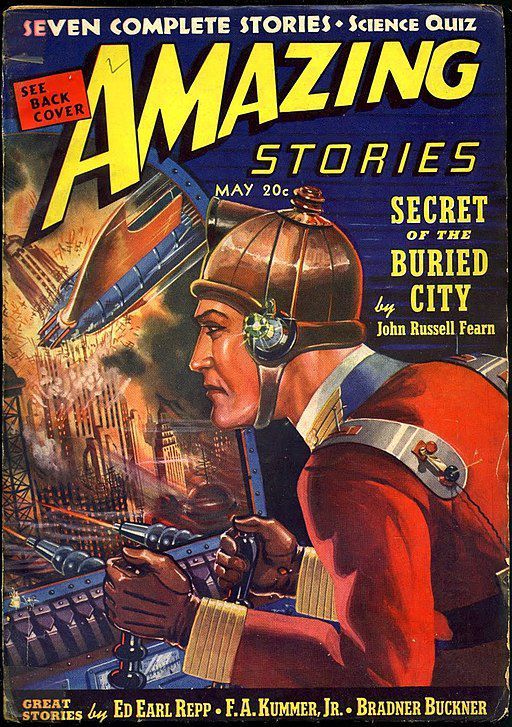
In the summer of 1987, movie audiences first met Robocop in the science fiction classic about violence and corrupt corporate power in a future, dystopian Detroit. But the title word is much older than that, going back at least to a 1957 short story by writer Harlan Ellison, in which a tentacled “robocop” pursues a character. The prefix “robo-,” in turn, dates at least to 1945, when Astounding Science Fiction published a story by A.E. van Vogt mentioning “roboplanes” flying through the sky. “Robo-,” of course, comes from “robot,” a word created by Czech author Karel Čapek in his 1920 play R.U.R.: Rossum’s Universal Robots, about synthetic humans created to perform drudge work who eventually rebel, destroying humanity.
This is the kind of rabbit hole a reader can go down in the Historical Dictionary of Science Fiction, a resource decades in the making that is now available to the public in an accessible form. Lexicographer Jesse Sheidlower started the project years ago, when he was an editor at the Oxford English Dictionary.
The OED is the best-known historical dictionary in the English-speaking world, and Sheidlower notes that it was also a crowdsourcing project long before the internet made it easy. When it was just starting out in the 19th century, he says, the OED put ads in literary magazines looking for volunteers to hunt around old books in search of particular words and their usage.
“People would mark up books, send in the notes,” he says. “To this day, it’s still how the system works to an extent.”
When the internet did arrive, the dictionary’s editors quickly took advantage. For example, Sheidlower says, at one point they were looking for early uses of the word “mutant” in the sense of a genetically mutated being with unusual characteristics or abilities. The earliest they’d found was from 1954, but they were sure earlier examples must be out there. So a freelance editor posted a query on Usenet newsgroups and quickly received an example of a use of the word from 1938.
Soon, the editors started looking for other online projects.
“This was at a time, around 2000, when there was the internet… and people were online, but it wasn’t universal like it is now,” Sheidlower says. “We wanted to do a project where people devoted to a particular field, fans, could make contributions.”
Not only were science fiction fans particularly likely to be online, but they were a valuable source of material. The world’s most prestigious libraries, where OED researchers did much of their work, generally didn’t carry back issues of pulp magazines of the mid-20th century, such as If or Amazing Stories. But many fans, it turns out had cartons full of them.
The new project, researching the history of key words used in science fiction, was written up on early blogs and sites like slashdot. Over the decade that followed, it attracted hundreds of contributors. In 2007, editor Jeff Prucher published a book based on the work, Brave New Words: The Oxford Dictionary of Science Fiction.
The project might seem to have run its course, but Sheidlower, who managed the project when he was with the OED, thought there was still work to be done on it. When he left the publication in 2013, he didn’t lose track of the project. Eventually, he got permission to revive it as a personal project. He continued to add terms and references, something made easier by two factors. First, over the past year, the forced inactivity during the pandemic gave him time to work. And second, staff and volunteers of the Internet Archive have uploaded more than 1,000 science fiction pulp magazines, making their entire contents accessible and searchable online.

The May 1939 cover of Amazing Stories, one of the earliest magazines exclusively focused on science fiction
(Robert Fuqua / Ziff-Davis Publishing via Wikimedia Commons under public domain)
Elizabeth Swanstrom, co-editor of the journal Science Fiction Studies and an English scholar at the University of Utah, says the dictionary is “a fantastic resource” not just for fans but for scholars interested in the history of science and technology.
“It’s not uncommon in science fiction to see ideas that are being explored later being put into actual practice” she says.
In some cases, science fiction authors are also scientists who bring real research developments into their writing. Others alter the culture’s understanding of new technologies even without technical expertise. Swanstrom notes that the author William Gibson created the idea of cyberspace back in 1982 and helped found the cyberpunk genre, despite not knowing a huge amount about how computers work.
“The terminology that came out of that genre really shaped culture, and continues to do so” Swanstrom says.
Isiah Lavender III, a professor of English at the University of Georgia and co-editor of the science fiction journal Extrapolation, says the dictionary could help in the academic analysis of issues like the social and economic issues reflected in authors’ depictions of robots. He notes that Čapek’s original robots were essentially enslaved beings with human-like thoughts and feelings. Isaac Asimov’s Laws of Robotics, introduced in 1941, could be seen as reflecting slave codes or the Jim Crow laws that still constrained many black Americans’ lives at that time.
“Having these origin dates in mind can help a student or scholar build a framework to analyze something like the concept of the racial ‘other’ where robots and androids (as well as aliens) are stand-ins for oppressed peoples,” Lavender says.
Lavender notes that the dictionary quotations, derived largely from mid-20th century pulp magazines, don’t reflect the diversity of the science fiction world. Many current black science fiction writers, such as Nalo Hopkinson and N.K. Jemisin, don’t make an appearance.
“From the little bit that I have explored in the dictionary, it comes across as a tool that supports a monochrome future envisioned by the golden age editors of the SFF magazines,” Lavender says. “So it’s problematic in that way.”
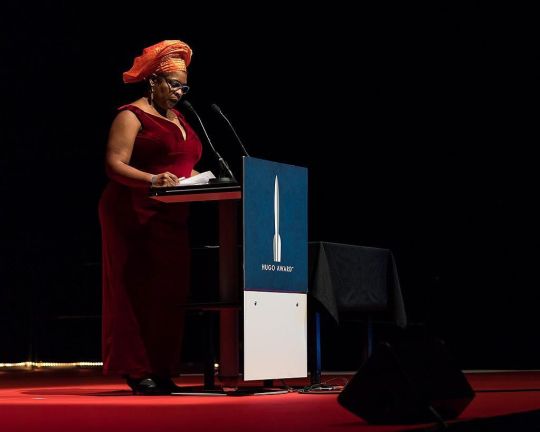
Nalo Hopkinson speaks at the 2017 Hugo Awards, a ceremony honoring science fiction works, at Worldcon 75 in Helsinki, Finland.
(Henry Söderlund via Wikimedia Commons under CC BY 4.0)
Sheidlower acknowledges that the dictionary is limited in the authors and terms it references, but he argues that this is a product of its mission: documenting the “core” vocabulary of science fiction that turns up again and again, both in stories and in the real world.
“When writers do more ‘interesting’ things, it becomes harder to include them in what is meant to be a study of the core vocabulary,” he says. “Samuel Delany is quoted a number of times when he’s writing about the usual space-travel stuff, but not much when he goes out of that range. There’s only one quote from [Delany’s dense, stylistically complex] Dhalgren, for example, but a lot from Babel-17, just as the OED has ten times more quotes from Ulysses than from Finnegans Wake.”
In general, Sheidlower says, to qualify for inclusion in the dictionary, a word must either be adopted widely within science fiction or become part of the broader culture. “Ansible”—a word for a device allowing faster-than-light communication coined by Ursula K. LeGuin—makes the cut because other authors also use it. Jemisin’s “orogenes”—people with the ability to control tectonic energy—do not because it’s a concept unique to her Broken Earth trilogy. Similarly, “Wookiee” is in the dictionary because Chewbacca is a familiar cultural figure, but dozens of other named alien species from the Star Wars universe that you can learn about on Wikipedia (or Wookieepedia) don’t merit entries.
Of course, it’s easy to find deep dives about nearly every science fiction universe on Wikipedia or elsewhere on the internet. Sheidlower says the dictionary’s mission is different.
“A dictionary’s not an encyclopedia,” he says. “There’s a reason for encyclopedias and there’s a reason for dictionaries.”
The dictionary is a streamlined way to see how terms have evolved over time, and read historical quotations that illuminate their meaning. It also links many of its quotations to the Internet Archive, where readers can see their context and even read the entire story.
Sheidlower says the dictionary, which he is continuing to update as a hobby, is still a work in progress. He anticipates expanding into related fields such as gaming, comics and anime. He also hopes to systematically add entries and quotations from books that have appeared in the ten years since the original phase of the project wrapped up. While Sheidlower has been doing most of the recent work himself, he is looking for volunteers to help out with tasks like checking citations, looking for quotations and drafting entries.
“I do hope there will be interest here,” he says. “For now, I’m still doing everything myself but the system does allow for other people doing that work.”
#Nature
0 notes
Text
Nepenthe - Steve Rogers x Reader (Part III)

Request: Hello!! Could I possibly request a Steve x reader imagine where the reader is younger than him? (Well, anyone would be younger than him). So maybe she is around twenty with a tragic background and she is the one who has been helping him adjust and then she helps him with the whole Bucky thing and they kinda end up together somehow. She is a SHIELD agent. (Something like a timeline from the moment he was revived up until whenever you want). I don’t know if it made sense, sorry. Thank you so much. Nepenthe: Something or someone that can make you forget grief or suffering. Safe heaven.
Warnings: My English, language, gifs aren’t mine. Credits to their original owners. Also, it deviates from the movies at some points but it’s pretty close. This is the last part. Guys, I am terribly sorry for not being more active but this semester is kicking my ass pretty bad.
PART I
PART II Word Count~3.5k+ MASTERLIST
Pending Requests
“Do you mind if I borrow a shirt? Mine is all messed up” you asked shyly. You were never the one to shy away from things especially when you wanted to impress the person who was standing in front of you but tonight felt different.
“Of course” he quickly answered and nodded his head as he walked over his wardrobe to grab one of his t-shirts. It was his favorite.He placed into your hands, his fingers briefly touching your causing shivers to travel through your spin. You glanced up and smiled, removing your hand quickly. It was that strange between the two of you since those nights back in Clint’s home.He had stopped acting like he actually wanted you, he had removed himself from your side and you had closed yourself. Everyone felt the tension whenever you were both in one room. But he hadn’t made a move. He had acted like nothing had happened. Sharon. You knew that those two had kissed and it hurt like hell because it was your voice that had pulled him out of his illusion, not hers.Wanda knew, not because she could read minds but because you would never look at him in the eyes. Natasha knew because she had found you crying in the middle of the night-she was with Bruce. Tony found out and wanted to strangle him but Bruce made him realize that it was probably a bad call. Sam and Clint had seen it coming from miles away. At the end of the day, you felt stupid. For trusting him, for believing that his kiss meant something, for falling for him.You turned around and walked into the bathroom, closing the door behind you. Or so you thought.Steve just stood there facing the door, not daring to look at the door because he had noticed that you had closed it but he never did hear the all too familiar sound. He slowly glanced up and noticed that the door wasn’t closed at all. He took a sharp breath and gulped trying to stop his mind from wandering back to the moments he had share with you. He had purposely stepped back. He wanted you but he knew that you were young and you deserved someone your age. People would always tell him that a relationship with someone like Sharon would be much better. But Sharon wasn’t you.He shook his head, shaking all the thoughts that weren’t supposed to be there, out of his head. He decided to simply close it quietly and slowly without seeing anything or being seen.His eyes stayed glued to the ground but he heard the sound of something falling to the ground and couldn’t help but look. It was your bra.He was staring at it like it was something he hadn’t seen anything like it before. Well, to be fair, he hadn’t. At least not like that. His mouth opened in pure wonder and glanced up a bit more, only to face your exposed back. He tried to remind himself that he had in fact left you with a million questions and that he was way too old for you. Maybe if he tried again with Sharon-His thinking was caught short.
“Like what you see?”. You knew that he was staring at you. You could hear his heartbeat. Besides, you were trained by the most lethal assassins. You could understand when people tried to sneak up on you. It never worked. He gulped again. You didn’t know what to think. He wasn’t supposed to be here but with Sharon. And yet you felt the burning need to turn around without your blouse on. You denied yourself that and you quickly pulled his T-shirt over your head. He hadn’t replied when you finally turned. Seeing you in his shirt got him all hot and bothered. He was such a bad liar. He was trying to stop thinking about you but he couldn’t.
“Um, are you… Alright?” he asked cautiously. You sighed and plopped down onto his bed. It had been a very bumpy ride, nothing was okay.
“It’s my fault. Those people. Innocent people. Dead because of me” you whispered, dropping your cool facade and letting him see you.
“None of what you said is true. It was most definitely not your fault. If anything, it was mine. You were trying to save my ass” he replied with a tone of certainty in his voice. He came and sat next to you and wrapped his arms around you without even thinking about it. You stiffened at first but you let yourself melt in his embrace. “Language” you softly reprimanded him and chuckled even though you felt your tears ready to escape your eyes. The thing was that if they were successful, you wouldn’t be able to stop. Just then Vision materialized inside the room, making you yelp in surprise.
“Vision, we have a door” Steve said slightly annoyed.
“I am sorry but Captain Rogers you wished to know when Mr. Stark was arriving” Vision replied apologetically. “Thank you. We’ll be right down”. You wanted to stay between his arms forever.
“I’ll… use the door. Oh, and apparently, he’s brought a guest” Vision commented as he made his way to the door.
“We know who it is?” you asked, sensing that something was wrong.
“The Secretary of State”. What the fuck? Vision left and Steve tightened his hold on you. You just wanted to admit it.
“I’m scared, Steve” you whispered and cupped your face with his soft hands.
“I am not gonna let anyone hurt you, love” he stated boldly. His eyes locked with yours and you felt that you had never gotten over him.
“It’s my fault” you pressed and you lowered your glance but his grip was strong.
“Never say that again. Never” he said tenderly but there was a strange tone in his voice that made you look at him again. He leaned forward. His breath was falling hot onto your lips. He was so close. And then he stood up and motioned to follow him. You wouldn’t cry. You wouldn’t cry. No. Fuck him. You held your head high, arched an eyebrow and walked past him. You would have to deal with this later.
You had no idea what had happened. The only thing that was for sure was that you had been taken out and probably Steve wasn’t the one who had kicked you to the ground. You opened your eyes and you came face-to-face with a man of your past.
“Comply” he growled in your ear, before tugging at your hair as you had a hard time trying to keep yourself up on your knees. He hit you hard in the face with his free hand making you groan in pain. He left you to hit the ground again but he didn’t want you to stay down as he gripped you by your hands and pulled you back up, tying them together with a chain.
“Never” you spit. He was expecting you to put up a fight and that’s why he wanted to bring their asset back. What he didn’t know was that the asset wasn’t under his orders anymore and that he wouldn’t be coming back.
“You don’t have a choice, возлюбленная” he said but your head snapped at the last word. He wasn’t messing around this time. He was using those damn words. Again. You thought you had fought them off and HYDRA didn’t control you anymore. Maybe you were wrong.
“No” you let out a growl. You fought against your cuffs. You wouldn’t comply. “ноябрь” he continued, his smirk as evil as him. You wouldn’t forget, you wouldn’t comply. They had only used the words once before and they had made you kill more than hundred innocent people. You had recovered, woken up, with blood on your hands, face and clothes and you had denied to even say a word for a month. You didn’t want that again.
“звезды” he said again. You felt your inner demon trying to get out but you would die first than let that happen. An idea popped into your head. You would let them believe that they had you under their control and then you would run away. To Steve. His other words were muffled- you never got to hear them because all you could think of was Steve. You would fight for him if you got out of there alive. Screw Sharon. He was your oxygen.
“Доброе утро, Солдат” he greeted you-or rather, the demon he thought that he had set loose.
“Я готов отвечать” you played along but freaked out nonetheless. You hoped that this was going to work out for you because otherwise…

“Where is she?” he demanded once he entered the room. He had lost you while he was chasing Bucky and T’Challa. He knew he shouldn’t have dragged you with him and maybe he should have listened to Tony.
“We… we don’t know but Steve… This smells like HYDRA” Tony answered him truthfully. They were in a glass-walled office overlooking the control room. Things were bad. With Bucky… like that and him being a criminal and without a shield… and you were gone. Things were very bad.
“Hey, you wanna see something cool? I pulled something from Dad’s archives. Felt timely. FDR signed the Lend-Lease bill with these in 1941. Provided support to the Allies when they needed it most.” Tony told him just a moment after, showing him two pens in a black presentation box. Steve looked at them, slightly surprised.
“Some would say it brought our country closer to war” he defended, arching his eyebrow, glancing up to meet Tony’s eyes.
“See? If not for these, you wouldn’t be here. I’m trying to… What do you call it? That’s an olive branch. Is that what you call it?” Tony said feeling uncomfortable and worried as hell at the same time. “Is Pepper here? I didn’t see her” Steve suddenly asked. He wanted to get out of that room and run like the Devil to find you.
“We’re kinda… Well, not kinda…” Tony trailed off, feeling the weight of the words sinking in.
“Pregnant?” Steve thought that would be a surprise. Seeing Tony as a father.
“No. Definitely not. We’re taking a break. It’s nobody’s fault” he answered, glad that no one was pregnant. He had lost Pepper and then he had lost you. His kind-of-adopted daughter.
“I’m so sorry, Tony. I didn’t know” Steve replied sincerely but his mind was somewhere else.
“You’re thinking about her, aren’t you?”. It didn’t feel like a question. It was a statement. Yet Steve nodded his head and looked away. Tony sighed. Of all people, you had to pick him.
“Sleeping with the enemy” he whispered dramatically and made Steve blush, chuckle and worry even more.
“No, Tony. That’s why I… removed myself. She is young. I am not. Hell, I’m hundred” Steve commented, momentarily forgetting about all the other problems.
“And Sharon made…sense, right?” he pressed further. He had seen the way you two looked at each other and he had confronted you about it many times. Steve looked at him pleadingly.
“We get out of this mess… you tell her how you feel. Got it?” Tony prompted him. When Steve didn’t react, he rolled his eyes and exhaled tragically slow. “She is in love with you. And yes, she might be like my kid and you and I don’t see eye to eye but her happiness is important. So, we find her, we get out of this and you… just quit thinking that she is too young for you. She is more mature than both of us and you know it”

The next time you saw Steve was moments after Zemo had pushed you to the center of the room, handcuffed and muffled by a piece of tape, next to the, now dead, Soldiers. And you didn’t just see Steve. You saw Bucky and Tony as well. That was unexpected. Steve was looking around, trying to understand what had happened. He didn’t see you at first. None of them did.
“I got heat signatures” Tony informed the other two. You wanted to scream and yell at them to get out of here but you were too weak. You didn’t even remember how many days and nights you had been beaten up and left to freeze and die.
“How many?” you heard him ask. That’s when you tried to move. Every cell of your body hurt like hell but you wouldn’t stay there. You had to do something. “Uh, two”. “If it’s any comfort, they died in their sleep. Did you really think I wanted more of you? I’m grateful to them, though. They brought you here” Zemo appeared in a control room. Steve hurled his shield but it flew right back to him.
“Please, Captain. The Soviets built this chamber to withstand the launch blast of UR-100 rockets”
“I’m betting I could beat that” Tony commented dryly.
“Oh, I’m sure you could, Mr. Stark. Given time. But then you’d never know why you came” Zemo answered ironically but you finally got out of the cuffs and pulled the tape.
“You killed innocent people in Vienna just to bring us here?” Steve asked directly to him.
“Steve” you yelled-or tried to. It wasn’t as loud as you would have thought but it was loud enough to make them turn their heads. He gasped. You were covered in bruises and blood. You were pale and thin and… freezing. Tony blasted the glass of the control room but nothing happened. The next words that were spoken were the words that no longer controlled you. But Zemo didn’t know. You saw Bucky’s terrified face and Tony’s worried glances around the place, but you kept your eyes locked with Steve’s. He was angry. Not just mad at someone. It would be the first time he truly wanted to kill another man just because he had hurt you. He had killed many men in his past but this time… it felt different. He took notice of your emotionless and indifferent face and he thought that you were gone, only to be surprised when you moved forward to face Zemo and spit out your own words. “Words don’t control me anymore”. Zemo seemed surprised and taken aback as everyone else. Especially Bucky. He wasn’t able to do that. But he moved fast. He played the surveillance footage from December 16th, 1991 and all hell broke loose.
“Get out of here. Go to the Jet. Now” Steve warned you. He understood what was about to happen. The footage showed Bucky killing Tony’s parents. You knew long before Zemo had told you. He grabbed you, crashed his lips on yours, kissed you feverishly for a moment and then he pushed you out of the room. You didn’t have a choice. You were too weak to try and stop them. “Don’t die” you whispered but he was long gone. You ran towards the Jet and waited.
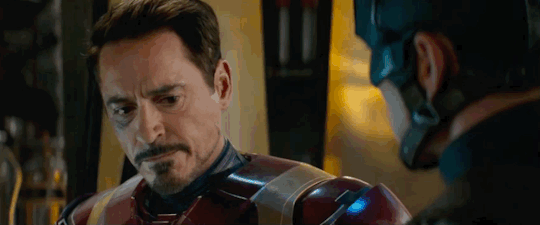

“You sure about this?” Steve asked for the millionth time. You too felt awful.
“I can’t trust my own mind. So, until they figure out how to get this stuff out of my head I think going back under is the best thing, …for everybody” Bucky whispered softly. He seemed peaceful in white.
“I can always try to help you Buck” you suggested warmly, knowing that this time you may never get to see him again. And more importantly, Steve just found his best friend again. And he was about to lose him. Again. Bucky smiled faintly but it was a true smile.
“Take care of her, she really is something else” he said to Steve, making you roll your eyes but you hugged him just a moment later.
“Till next time” Steve nodded his head as Bucky went back into cryo. You walked out of the room and smiled at T'Challa who was waiting patiently outside, not wanting to interrupt. “Thank you for this” Steve thanked him again.
“Your friend and my father, they were both victims. If I can help one of them find peace…” T’Challa trailed off as he looked at you.
“You know, If they find out he’s here… they’ll come for him” Steve commented, too worried to hide it.
“Let them try” he answered certain of this place. You stayed silent for a while, gazing out of the window. You would stay here for the night and then head back … home? What was home?
“You should rest Y/N. You both are welcome here.” T’Challa told you, taking in your state. You smiled faintly and nodded in agreement. You walked over to your room alone. You knew that Steve wanted to talk to him alone and all that, and to be honest you just wanted… serenity. Wasn’t that what we all looked for? You walked in and instead of admiring the big and obliviously wealthy room, you turned off the lights and opened the curtains, so that the only light that was illuminating your thoughts was the moonlight. You sat down and tried to push the memories away. You were too caught up in your own hard world that you never realized Steve was inside your room and staring at you worryingly. He thought it was his fault. He would always blame himself for letting you out of his sight in the first place. He felt creepy, watching you like that. He cleared his throat and you glanced up.
“Do you need anything?” he asked you politely. You had a chance.
“Actually, yes, Steve. I do” you answered truthfully. You wanted to know what you were to him. If you were something. He nodded for you to continue.
“To be honest with me…” you whispered and you knew that there was no turning back. Either, things went well or… that was it. No more play-pretend. No more lies and sneaking around. He understood that he needed to come clean with you. He knew that you deserved better than lies and bullshit. Yet he couldn’t find the words to tell you so. He just plopped down next to you as you were trying to put the pieces together; and then you just snapped. “For fuck’s sake Steve! I asked you to tell me the truth. I have been through hell, my head feels like it’s about to crack and I don’t even know what I’m gonna do. I have no place anymore. I…” you had started off by yelling at him but eventually had trailed off because… you just wanted to be left alone.
“You’re so busy trying to be what everyone else wants you to be that you don’t know who you are” he snapped back at you and instead of slapping him, you grabbed him by his shirt and crashed your lips together. You were aware of the… proximity of your bodies. And you were very well aware of Sharon but you really didn’t care. He didn’t respond immediately and you thought that you had screw things up.
“You deserve better than this,” he murmured against your lips but you have had enough.
“I am capable of deciding what I do and don’t deserve” you whispered as he pulled away a bit. You watched him taking a deep breath, trying to control what he wanted. Screw it. You brought his hands to your waist as his eyes traveled to where you had placed them but he was staring not just glancing. You could hear his breath coming in shorter spans, his full lips slightly parted as you slid your arms around his neck, leaning in just close enough to be able to feel his body against yours.
“I want you, Steve”. The moment the words left your mouth, Steve’s lips were claiming yours with possession, his hands pulling you to close the tiny bit of distance between your bodies and pressed himself against you.
“You have no idea how much I want you” he mumbled in between the hungry kisses. His hands traveled and tightly gripped your hips as he made you straddle him. It would be fair to say that you never joined T’Challa for dinner.

Tags: @orionsirivsblack @kapolisradomthoughts @nadinissavage @geeksareunique
#captain america#captain america imagine#steve rogers imagine#steve rogers x reader#steve rogers#steve x reader#steve rogers fanfiction#captain america x reader#captain america fanfiction#the avengers#avengers imagine#avengers x reader#bucky barnes imagine#tony stark imagine#bucky x reader#tony stark x reader#mcu imagine#mcu#marvel imagine
84 notes
·
View notes
Text
9 Historical Games We're Thankful for This Thanksgiving
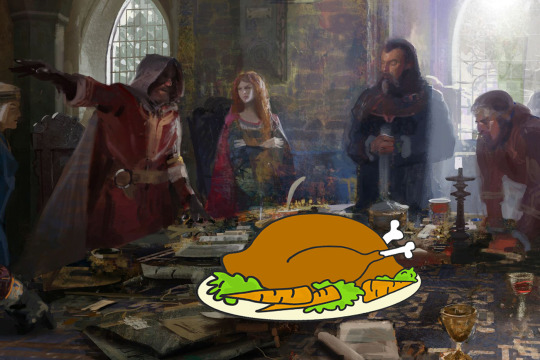
It’s a tradition in many households to gather around the turkey on Thanksgiving Day and list off the things you’re thankful for. Unfortunately, 2020 may make it difficult to think of anything. Unless, of course, you want to thank the video game developers that have provided you a mental escape throughout the year.
Along with my health and the health and safety of my family, I would like to highlight some of the historical games that offered a means of educational entertainment. The teams behind these nine games made it possible to be thankful for a digital experience as they fleshed out historical periods, put the spotlight on notable figures from the past, and twisted the stories of yesteryear to fit within a fictional tale.
Partisans 1941

The Eastern Front of World War II is a popular location in gaming. If it’s a World War II title, chances are it’s taking place somewhere on the Eastern Front. That makes it incredibly easy for games to get lost in the shuffle. Partisans 1941 is kind of one of those games, and it really doesn’t deserve to be pushed aside.
A blend of stealth action and real-time strategy gaming comes helps tell the story of Russian Partisans that pushed back against the German occupation. Unlike traditional RTS games, Partisans 1941 focuses heavily on guerilla warfare, and players will need to perfect tactical stealth to dismantle the German stronghold. It’s not a perspective of the war we’re used to seeing, but it’s definitely one we’re happy was given the spotlight in 2020.
Hades
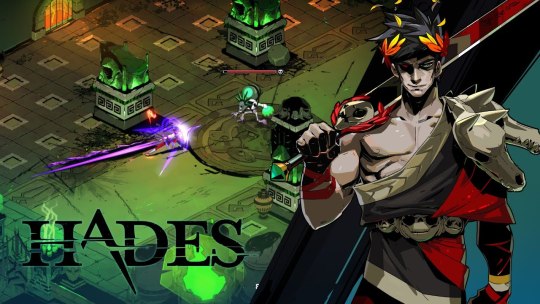
Mythology and history often go hand-in-hand, with the former being a piece of a culture’s history. Hades may not have the cadence of a historical game, but there is so much Grecian lore worked in that it’s hard to ignore the work Supergiant Games put into research.
The roguelike RPG puts players in the shoes of Zagreus, the Prince of the Underworld. Equipped with his trusty blade and a host of mystical powers, Zagreus hacks and slashes his way through hordes of enemies - but all it takes is one wrong move for the outnumbered hero to fail. Thankfully, the Gods of Olympus are on his side, providing Zagreus with enhancements to help him on his quest.
Hades features notable names from Greek mythology like Sisyphus, Patroclus, Tartarus, Zeus, Athena, Poseidon, and many more. Fans of mythology and mystical lore will definitely want to sink their teeth into Hades.
Panzer Corps 2
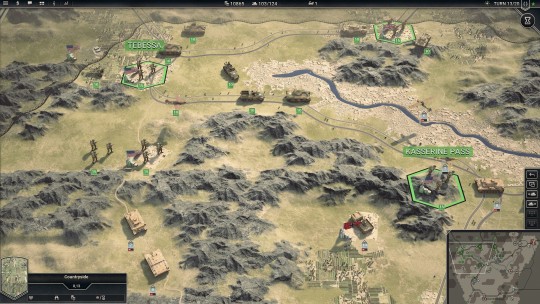
Wargaming can be intimidating, but Flashback Games found a way to highlight the complexities of the genre while keeping it user-friendly for newcomers. Panzer Corps 2 is a worthy sequel, putting a strategic spin on World War II utilizing proven gameplay mechanics that work well with the 20th-century conflict.
When it comes to history, Panzer Corps 2 is robust with authentic references to the Second World War. Players have access to more than 1,000 unique units, from expertly recreated vehicles to foot soldiers to lead the charge. The wargame features upwards of 60 scenarios spread across a branching campaign that integrates real moments of the war.
Panzer Corps 2 is a fantastic game to play alone, but the online component allows players to marvel at the history of World War II across ten multiplayer-driven scenarios. Looking for more after your playthrough? Then you’ll enjoy the innovative Scenario Editor that lets you design your own World War II campaign.
Builders of Egypt: Prologue
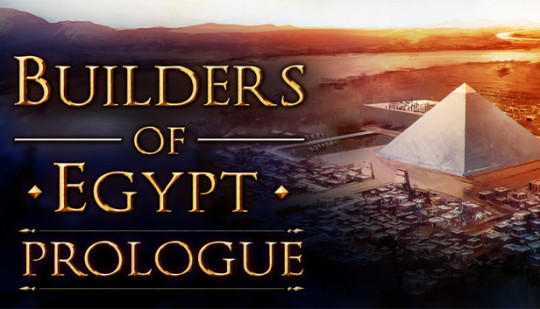
Ancient Egypt is one of the world’s most fascinating historical civilizations, so any game revolving around the time of Pharaohs and mummies is worth a try. Builders of Egypt: Prologue is a rather intriguing look at the ancient society, with a city-building mechanic that really puts you in control of the Nile Valley.
Every facet of society is in your hands, from the construction of essential buildings to the economy that keeps the individual cities running. Strategy Labs is no stranger to simulation games, but the development team hit it out of the park with this take on Ancient Egypt.
Construct towering pyramids, build roads that connect cities to vital resources, and command ruthless armies as the threat of civil war worsens. From diplomacy to religion, all of Egypt is in your hands.
Medieval Dynasty

Do you have what it takes to survive in a medieval age? Without the benefits of technology and shelter from Mother Nature’s unforgiving temper? Boot up Render Cube’s Medieval Dynasty and see if you have what it takes to forge a path to greatness.
Embark on an adventure that will take you from the very beginning as an inexperienced citizen of a budding village. Battle the elements and anyone that gets in your way, learn new skills to increase your chances of survival and rise to the top of your own dynasty. Medieval Dynasty is less of a historic game and more of a fleshed-out period piece that gives a glimpse of life in the past.
Equipment and buildings offer an authentic feel as you try to survive night after night. Medieval Dynasty is an RPG game at its core, forcing players to beef up their character and tend to the very basic needs of the everyman. There’s plenty to do as you expand your dynasty, so expect to sink plenty of hours in this open-world adventure.
Assassin’s Creed Valhalla

After catering its past two games to RPG fans, Ubisoft opted to return to the roots of the Assassin’s Creed series with Valhalla. In fact, some may say it regressed a bit with an experience that’s brutal, violent, and bloody. Quite frankly, it embodies the ruthlessness we’ve come to associate with Vikings, but there’s another layer to Assassin’s Creed that brings everything down to reality.
Yes, Valhalla works in a bit of mysticism, but the story is still very human. As Eivor, players guide their people from an unforgiving Norway to England, where they’ll struggle to erect a safe place to call home. The storytelling is ripe with historical authenticity with figures like King Alfred the Great of Wessex and Ivar the Boneless, a real Viking ruler that took part in the actual invasion of England.
Valhalla could use a little polish, but the overall experience brings back memories of the series’ earlier entries and is definitely a worthy addition.
Through the Darkest of Times
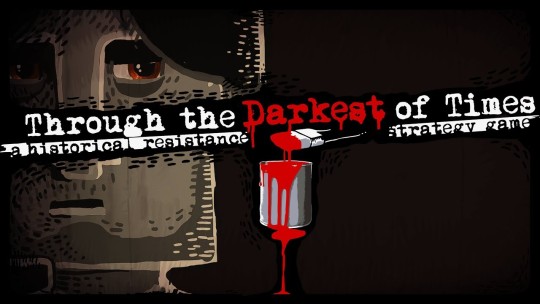
Most World War II games take place during the conflict. Through the Darkest of Times takes players to a few years before Germany invaded Poland, as Adolf Hitler rises to power. Beneath the new chancellor, residents of Germany had to find ways to survive. You either joined Hitler’s cause, perished at the hands of his followers, or, if you were brave enough, took part in an underground resistance.
Through the Darkest of Times allows you to live out the third scenario as the leader of a small resistance. You can’t take the Nazi regime head-on, so you’ll have to plan small-but-significant attacks that will help topple Hitler’s forces. Share vital information, inspire an uprising, and sabotage the regime in this simulation strategy.
Across four chapters, you’ll face difficult decisions that will undoubtedly get your followers killed while gaining ground against the Nazis. Can you stand to make those sacrifices and carry the weight of your choices? Find out in this interactive experience that plays out in a unique expressionist style.
Crusader Kings III
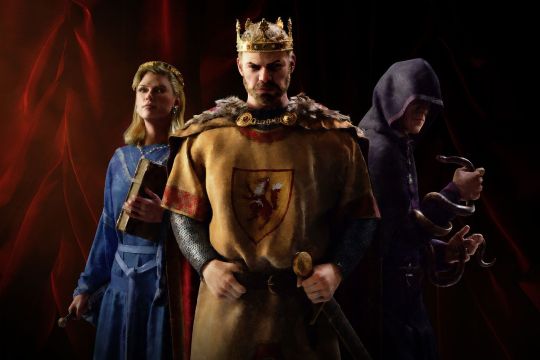
Crusader Kings III took the year by storm, putting players in the role of a royal or noble house member. The series has always been known for its historical roots, and the third entry further solidifies them as you guide your people across generations, securing the sanctity of your dynasty.
Will you be a kind king that watches over his people or a ruthless ruler with a thirst for expansion and riches? With an army at your disposal, how you rule is completely up to you. But be sure that your people are actually on your side. Even the most violent of kings have detractors waiting to put your head on a pike.
Crusader Kings III captures the essence of ruling a kingdom, integrating touches of history in how its scenarios play out. There is no guaranteed victory in this RPG strategy game, so be prepared for every outcome on your quest for power.
Desperados III
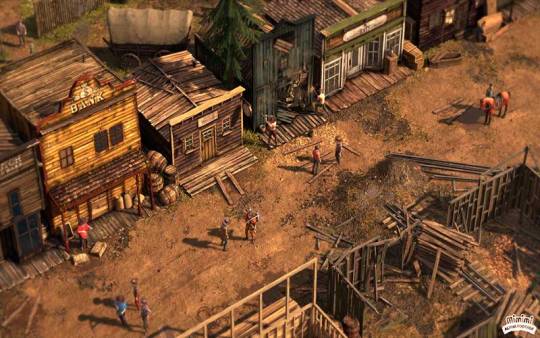
Rounding out the long-running Desperados is this prequel, which sets up the relationships of the Wild West RTS series. Surviving in the Old West means knowing when to run ‘n gun and when to stick to the shadows. In Desperados III, that’s the only way to make it to the end!
Employing tactics that vary from stealth takedowns to long-range stun attacks, players guide the titular Desperados on a quest for redemption. Players are tasked with reading the map and planning the best method of attack. Using the skills and abilities of the four very different characters is sometimes the only way to succeed.
The game takes place in beautifully rendered environments that look to have been ripped right out of Wild West history.
--
At SJR Research, we specialize in creating compelling narratives and provide research to give your game the kind of details that engage your players and create a resonant world they want to spend time in. If you are interested in learning more about our gaming research services, you can browse SJR Research’s service on our site at SJR Research.
0 notes
Photo

Ellis Watts III→ Aldis Hodge → Jackal
→ Basic Information
Age: 99
Gender: Male
Sexuality: Straight
Born or Made: Born
Birthday: December 25th
Zodiac Sign: Capricorn
Religion: Christian
→ His Personality
Ellis Watts is a workaholic. He has spent the entire duration as head of the Jackals looking for ways to better the clan and push them into more prominent positions within the city. This includes heavily encouraging the jackals in his clan to pursue a degree and better themselves intellectually. He also serves the citizens of Chicago as the City Planner. He has been making significant efforts to improve the quality of life for both supernaturals and humans. He is very dedicated to his work and responsibilities and does not falter in his duties. He is disciplined, often working nights and weekends until a project is seen through to the end.
However when Ellis relaxes, he does so in style. He loves expensive clothes and timepieces, nice cars, and excessive hobbies. Since he could get his hands on them, he’s loved anything with a motor: cars, motorcycles, and speed boats. Only recently has he begun to tackle the skies. It was a 95th birthday present to himself, and he’s almost put enough hours in to finally obtain his license to fly. He also enjoys spirits, and has begun making his own wine. This harkens back to his youth filled with mild over indulgence and a desire to escape.
→ His Personal Facts
Occupation: Head of Clan Jackal and City Planner
Scars: None
Tattoos: None
Two Likes: High end watches and Fast vehicles
Two Dislikes: Idle hands and People who ride their brakes
Two Fears: Failing at leading the Jackals and Heights
Two Hobbies: Boat Racing and Wine Making
Three Positive Traits: Responsible, Disciplined, Ambitious
Three Negative Traits: Work-Obsessed, Superficial, Stubborn
→ His Connections
Parent Names:
Ellis Watts II (Father): Ellis did not have a very strong relationship with his father, contrary to everyone in their pack. They were not very affectionate towards one another and often got into spats. Though it appeared that Ellis Watts II was handing his son the keys out of respect, in reality he left out of spite. They didn’;t have any other contact with one another for the rest of his life.
Lucretia Watts (Mother): Lucretia was old, much older than Ellis’s father, when they mated and died while Ellis was 30. Ellis was close to his mother, and she instilled many of the mantras he repeats and follows to this day.
Sibling Names:
None
Children Names:
None.
Romantic Connections:
Mary-Alice Lewis (Ex Girlfriend): He met Mary Alice when he was away for school. Too many things were trying to work against them, and when he asked her to come back home with him, she said no. He still thinks about her often and has thought about trying to see if she was still with her clan.
Miriam Vance (Ex Girlfriend): They dated in the 1970s for a few years. He was just getting in the meat of his political career and she wanted lots of children immediately. They parted ways and last he knew she moved to San Francisco.
Platonic Connections:
Sarah Harris (Best Friend): Sarah has been one of his longest friends and is often the person to call him out. He is the Godfather to both of their daughters and spends most holidays with their family.
Zack Harris (Best Friend): Zack is his most trusted confidante. They throw ideas around, playing with possibilities, before eventually bringing it to Sarah who helps make the idea possible.
Shannon Harris (Goddaughter): He has known Shannon since she was born. She’s a mini-Sarah through and through and he has recently begun training her to begin as a liaison to the pack. With the new influx of supernaturals that may come due to the University, Ellis wants to be ready.
Zelda Harris (Goddaughter): He has known Zelda since she was born. She was always a very independent child, taking the harder and often more daring road. Despite Sarah’s surprise, he saw Zelda forming her own path long before she finally told her mother she wasn’t going to school. He has her placed in the water department.
Odell Rella (Friend): Ellis brought Odell on as 3rd about 9 years ago, after he returned home from going to college and travelling the world. It’s a perspective that Jackals don’t often have and he values his input because of that. He’s still an idiot, but he does a good job as 3rd.
Seth Allen (Curious about): Seth is somewhat of an enigma to Ellis, Zack and Sarah. He is wild and difficult, but the strangest thing is that he doesn’t really act like a jackal, or at least not like anyone in Chicago. He loves being shifted and running in his shifted form. Seth also seems somewhat uncomfortable with the family dynamics that most of the clan has. Ellis has been mulling over their new addition a lot, and has even gone on a run with him in shifted form to see if it’d shed any more light.
Vee Armstrong (Employee): Vee has shown her work ethic since she was in college and Ellis took notice. When Sirius proposed getting a Human Shifter elected with the jackal’s help; Ellis knew she’d be the best person to get them there. So far she’s impressed him, and the early polls indicate Fischer will win.
Leon King (Friendly): Ellis knows of Leon through his work with the kids. He increased general activity and helped spearhead a childhood activity project that got kids moving.
Clara Fields (Fellow Council Member): Ellis doesn’t often talk to Clara, actually avoids it when he can, but they’ve known each other for a long time and he respects her work ethic.
Isaac Baker (Friend): Ellis has liked having Isaac on the council. He’s smart and isn’t weighed down by a century of baggage like the rest of them. They occasionally go to sports games together.
Chris Bialar (Work Associate): Chris came to him a year or two ago to suggest creating a University for the supernatural community. Clan Cat was experienced with the education side of things, while Clan Jackal could encourage the permit and general bureaucratic business along. Before their business venture Ellis thought he was an arrogant asshole, now he’s an arrogant asshole with a plan to get more Jackals to the city.
Nick Hamelin (Fellow Council Member): He and Nick are on good terms. The rats don’t invade any areas they shouldn’t and in return they don’t try to keep too much from them.
Percy McCormick III (Fellow Council Member): Ellis is fairly neutral about Percy. They’ve never really hit off, unlike him and the Fields, and it’s not something he’s interested in trying to start.
Greer Finley (Work Associate): Greer is the 2nd of the Cats and is spearheading much of the project on the Cat’s end. He tends to work with her on projects to avoid putting her and Sarah in the same room.
Amaria Crais (Work Associate): Amaria is the main liaison between the Cats and Jackals for the University project. He finds her much easier to deal with than Greer.
Asa Fields (Old Friend): He hasn’t spoken to Asa since he has been back, but the two would occasionally meet at parties around the city. He’s interested in seeing how he’s changed over the years.
Sirius Cobic (Business Partner): Sirius proposed the idea of getting a supernatural to the top of the Chicago government about a year and a half ago. They need someone with real power to rule and a human shifter would be the only one who could make it. Together they developed a plan, and are currently seeing it play out.
Hostile Connections:
Russell Jordan (Concerned about): Russell quickly shut down many lines of connections that had existed between the hyenas and jackals since they’d arrived. He claimed it was to unify the clan under new leadership, but they haven’t opened back up.
Alan Thomas (Annoyance): He’s never seen anyone argue so much over building codes that have been public knowledge for years. Thomas takes any slow down as a personal offence and doesn’t care to restrain himself from throwing a fit.
Pets:
None
→ History
Ellis was born in Chicago to Ellis Watts II and Lucretia Watts. Unusually for jackals the pair married at quite old ages and Ellis III was the only child they ever had. Lucretia was showing signs of slowing down when Ellis was a young boy, so it was only a matter of time when she passed away. He was away for many of her last years, and when he returned from school she refused to shift back into her human form. Ellis spent much of his time shifted the last year of her life so they could communicate easier. When she finally died, he didn’t change for years. It was at this time of no shifting that Ellis discovered his love for fast machines; motorcycles, cars, boats, anything he could feel the exhilaration of. He also garnered some criticism at this time, specifically from his father who thought he was being frivolous and wasteful. This was the beginning of what would become decades of arguments between the two men.
They fought about him not using his degree or getting a useful job, about Elli II being inflexible and running members out of Chicago. This was all hidden from the packs eyes as their leader having the least happy family of all might cause an uproar in such a family oriented clan. The only members who were aware were Sarah and Zack Harris, his father’s seconds. Finally in 1941, after a particularly brutal argument Ellis II quit, told his son that he could burn the pack down if he wanted, but that he wouldn’t be around to watch. He packed up his things and left the clan to Ellis to rule, with the obvious assumption he’d fail. Ellis, like he did in many instances rose to the occasion. He hunkered down and learned everything: each pack family, who needed assistance, what needed to be done, where there were spots they could expand. It was Ellis who made the switch into the Government and slowly began securing good jobs with good pay for his people. He finally joined office himself once he was legally able to and has been City Manager on and off for many years.
After he switched into being a leader, he’s had a difficult time turning it off. It’s ruined any relationship he’s had, caused tension headaches and teeth grinding, and he rarely if ever takes a day off. He still maintains many of his hobbies like boat racing, wine making, and now piloting; but work and his clan is always in the back of his mind.
→ The Present
Ellis would like to find a wife and start a family. Sarah says it was his dysfunctional family life that’s scared him off. Which is partially true, but he’s worried that he’ll start slipping if he relaxes too much. He’s actually considered asking Sarah or Shannon to set him up, but he’s not sure that he is that desperate yet.
Ellis is also creating a University with the Cats. He, Sarah, and Zack have been in talks for about a year or so developing the idea, but they are going to break ground soon. He’s excited to have a new school for his Jackals to go to, as well as a new draw for the supernatural community. Another venture he’s taking on, though in a much more removed position, is the election of human shifter, Robert J. Fischer. It was an idea concocted with the human shifters to get a member of the supernatural community in the highest seat of power. Though the council previously ruled no species could be in the mayor’s office due to an unequal balance of power, Ellis knows they don’t understand the nature of modern politics.
→ Available Gif Hunts (we do not own these)
Aldis Hodge [1][2][3][4]
0 notes
Photo

Ellis Watts III→ Aldis Hodge → Jackal
→ Basic Information
Age: 99
Gender: Male
Sexuality: Straight
Born or Made: Born
Birthday: December 25th
Zodiac Sign: Capricorn
Religion: Christian
→ His Personality
Ellis Watts is a workaholic. He has spent the entire duration as head of the Jackals looking for ways to better the clan and push them into more prominent positions within the city. This includes heavily encouraging the jackals in his clan to pursue a degree and better themselves intellectually. He also serves the citizens of Chicago as the City Planner. He has been making significant efforts to improve the quality of life for both supernaturals and humans. He is very dedicated to his work and responsibilities and does not falter in his duties. He is disciplined, often working nights and weekends until a project is seen through to the end.
However when Ellis relaxes, he does so in style. He loves expensive clothes and timepieces, nice cars, and excessive hobbies. Since he could get his hands on them, he’s loved anything with a motor: cars, motorcycles, and speed boats. Only recently has he begun to tackle the skies. It was a 95th birthday present to himself, and he’s almost put enough hours in to finally obtain his license to fly. He also enjoys spirits, and has begun making his own wine. This harkens back to his youth filled with mild over indulgence and a desire to escape.
→ His Personal Facts
Occupation: Head of Clan Jackal and City Planner
Scars: None
Tattoos: None
Two Likes: High end watches and Fast vehicles
Two Dislikes: Idle hands and People who ride their brakes
Two Fears: Failing at leading the Jackals and Heights
Two Hobbies: Boat Racing and Wine Making
Three Positive Traits: Responsible, Disciplined, Ambitious
Three Negative Traits: Work-Obsessed, Superficial, Stubborn
→ His Connections
Parent Names:
Ellis Watts II (Father): Ellis did not have a very strong relationship with his father, contrary to everyone in their pack. They were not very affectionate towards one another and often got into spats. Though it appeared that Ellis Watts II was handing his son the keys out of respect, in reality he left out of spite. They didn’;t have any other contact with one another for the rest of his life.
Lucretia Watts (Mother): Lucretia was old, much older than Ellis’s father, when they mated and died while Ellis was 30. Ellis was close to his mother, and she instilled many of the mantras he repeats and follows to this day.
Sibling Names:
None
Children Names:
None.
Romantic Connections:
Mary-Alice Lewis (Ex Girlfriend): He met Mary Alice when he was away for school. Too many things were trying to work against them, and when he asked her to come back home with him, she said no. He still thinks about her often and has thought about trying to see if she was still with her clan.
Miriam Vance (Ex Girlfriend): They dated in the 1970s for a few years. He was just getting in the meat of his political career and she wanted lots of children immediately. They parted ways and last he knew she moved to San Francisco.
Platonic Connections:
Sarah Harris (Best Friend): Sarah has been one of his longest friends and is often the person to call him out. He is the Godfather to both of their daughters and spends most holidays with their family.
Zack Harris (Best Friend): Zack is his most trusted confidante. They throw ideas around, playing with possibilities, before eventually bringing it to Sarah who helps make the idea possible.
Shannon Harris (Goddaughter): He has known Shannon since she was born. She’s a mini-Sarah through and through and he has recently begun training her to begin as a liaison to the pack. With the new influx of supernaturals that may come due to the University, Ellis wants to be ready.
Zelda Harris (Goddaughter): He has known Zelda since she was born. She was always a very independent child, taking the harder and often more daring road. Despite Sarah’s surprise, he saw Zelda forming her own path long before she finally told her mother she wasn’t going to school. He has her placed in the water department.
Odell Rella (Friend): Ellis brought Odell on as 3rd about 9 years ago, after he returned home from going to college and travelling the world. It’s a perspective that Jackals don’t often have and he values his input because of that. He’s still an idiot, but he does a good job as 3rd.
Seth Allen (Curious about): Seth is somewhat of an enigma to Ellis, Zack and Sarah. He is wild and difficult, but the strangest thing is that he doesn’t really act like a jackal, or at least not like anyone in Chicago. He loves being shifted and running in his shifted form. Seth also seems somewhat uncomfortable with the family dynamics that most of the clan has. Ellis has been mulling over their new addition a lot, and has even gone on a run with him in shifted form to see if it’d shed any more light.
Vee Armstrong (Employee): Vee has shown her work ethic since she was in college and Ellis took notice. When Sirius proposed getting a Human Shifter elected with the jackal’s help; Ellis knew she’d be the best person to get them there. So far she’s impressed him, and the early polls indicate Fischer will win.
Leon King (Friendly): Ellis knows of Leon through his work with the kids. He increased general activity and helped spearhead a childhood activity project that got kids moving.
Clara Fields (Fellow Council Member): Ellis doesn’t often talk to Clara, actually avoids it when he can, but they’ve known each other for a long time and he respects her work ethic.
Isaac Baker (Friend): Ellis has liked having Isaac on the council. He’s smart and isn’t weighed down by a century of baggage like the rest of them. They occasionally go to sports games together.
Chris Bialar (Work Associate): Chris came to him a year or two ago to suggest creating a University for the supernatural community. Clan Cat was experienced with the education side of things, while Clan Jackal could encourage the permit and general bureaucratic business along. Before their business venture Ellis thought he was an arrogant asshole, now he’s an arrogant asshole with a plan to get more Jackals to the city.
Nick Hamelin (Fellow Council Member): He and Nick are on good terms. The rats don’t invade any areas they shouldn’t and in return they don’t try to keep too much from them.
Percy McCormick III (Fellow Council Member): Ellis is fairly neutral about Percy. They’ve never really hit off, unlike him and the Fields, and it’s not something he’s interested in trying to start.
Greer Finley (Work Associate): Greer is the 2nd of the Cats and is spearheading much of the project on the Cat’s end. He tends to work with her on projects to avoid putting her and Sarah in the same room.
Amaria Crais (Work Associate): Amaria is the main liaison between the Cats and Jackals for the University project. He finds her much easier to deal with than Greer.
Asa Fields (Old Friend): He hasn’t spoken to Asa since he has been back, but the two would occasionally meet at parties around the city. He’s interested in seeing how he’s changed over the years.
Sirius Cobic (Business Partner): Sirius proposed the idea of getting a supernatural to the top of the Chicago government about a year and a half ago. They need someone with real power to rule and a human shifter would be the only one who could make it. Together they developed a plan, and are currently seeing it play out.
Hostile Connections:
Russell Jordan (Concerned about): Russell quickly shut down many lines of connections that had existed between the hyenas and jackals since they’d arrived. He claimed it was to unify the clan under new leadership, but they haven’t opened back up.
Alan Thomas (Annoyance): He’s never seen anyone argue so much over building codes that have been public knowledge for years. Thomas takes any slow down as a personal offence and doesn’t care to restrain himself from throwing a fit.
Pets:
None
→ History
Ellis was born in Chicago to Ellis Watts II and Lucretia Watts. Unusually for jackals the pair married at quite old ages and Ellis III was the only child they ever had. Lucretia was showing signs of slowing down when Ellis was a young boy, so it was only a matter of time when she passed away. He was away for many of her last years, and when he returned from school she refused to shift back into her human form. Ellis spent much of his time shifted the last year of her life so they could communicate easier. When she finally died, he didn’t change for years. It was at this time of no shifting that Ellis discovered his love for fast machines; motorcycles, cars, boats, anything he could feel the exhilaration of. He also garnered some criticism at this time, specifically from his father who thought he was being frivolous and wasteful. This was the beginning of what would become decades of arguments between the two men.
They fought about him not using his degree or getting a useful job, about Elli II being inflexible and running members out of Chicago. This was all hidden from the packs eyes as their leader having the least happy family of all might cause an uproar in such a family oriented clan. The only members who were aware were Sarah and Zack Harris, his father’s seconds. Finally in 1941, after a particularly brutal argument Ellis II quit, told his son that he could burn the pack down if he wanted, but that he wouldn’t be around to watch. He packed up his things and left the clan to Ellis to rule, with the obvious assumption he’d fail. Ellis, like he did in many instances rose to the occasion. He hunkered down and learned everything: each pack family, who needed assistance, what needed to be done, where there were spots they could expand. It was Ellis who made the switch into the Government and slowly began securing good jobs with good pay for his people. He finally joined office himself once he was legally able to and has been City Manager on and off for many years.
After he switched into being a leader, he’s had a difficult time turning it off. It’s ruined any relationship he’s had, caused tension headaches and teeth grinding, and he rarely if ever takes a day off. He still maintains many of his hobbies like boat racing, wine making, and now piloting; but work and his clan is always in the back of his mind.
→ The Present
Ellis would like to find a wife and start a family. Sarah says it was his dysfunctional family life that’s scared him off. Which is partially true, but he’s worried that he’ll start slipping if he relaxes too much. He’s actually considered asking Sarah or Shannon to set him up, but he’s not sure that he is that desperate yet.
Ellis is also creating a University with the Cats. He, Sarah, and Zack have been in talks for about a year or so developing the idea, but they are going to break ground soon. He’s excited to have a new school for his Jackals to go to, as well as a new draw for the supernatural community. Another venture he’s taking on, though in a much more removed position, is the election of human shifter, Robert J. Fischer. It was an idea concocted with the human shifters to get a member of the supernatural community in the highest seat of power. Though the council previously ruled no species could be in the mayor’s office due to an unequal balance of power, Ellis knows they don’t understand the nature of modern politics.
→ Available Gif Hunts (we do not own these)
Aldis Hodge [1][2][3][4]
0 notes
Text
LUCKY PARTNERS
September 25, 1944
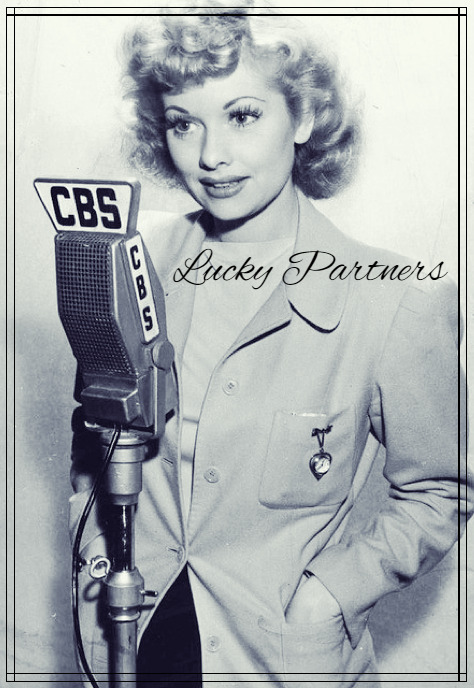
“Lucky Partners” was a presentation of Lux Radio Theatre, broadcast on CBS Radio on September 25, 1944.
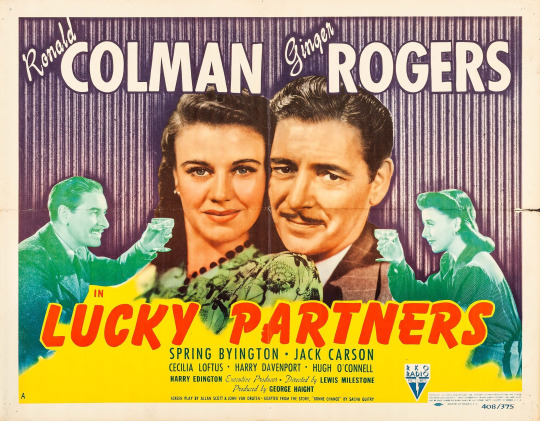
It is based on a 1940 RKO film of the same name directed by Lewis Milestone which in turn was based on the 1935 French film Good Luck. Lucky Partners the movie starred Ronald Colman and Ginger Rogers in their only film together. The radio script was adapted by John Van Druten from the screenplay by Allen Scott.
This is the second radio adaptation of the film. In April 1941 The Screen Guild Theater broadcast a 30 minute radio adaptation with Ginger Rogers reprising her film role. In this adaptation, the role is played by Rogers’ friend Lucille Ball.
Synopsis ~ A man and a woman go partners on a winning sweepstakes ticket. In return for partnering, the man insists they go on a platonic honeymoon, despite the woman’s engagement to another man. When things get more than platonic, the man’s past is exposed and everyone ends up in court.

Lux Radio Theatre (1935-55) was a radio anthology series that adapted Broadway plays during its first two seasons before it began adapting films (”Lux Presents Hollywood”). These hour-long radio programs were performed live before studio audiences in Los Angeles. The series became the most popular dramatic anthology series on radio, broadcast for more than 20 years and continued on television as the Lux Video Theatre through most of the 1950s. The primary sponsor of the show was Unilever through its Lux Soap brand.
CAST
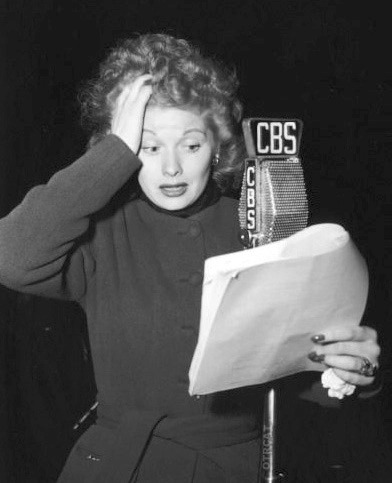
Lucille Ball (Jean Newton) was born on August 6, 1911 in Jamestown, New York. She began her screen career in 1933 and was known in Hollywood as ‘Queen of the B’s’ due to her many appearances in ‘B’ movies. “My Favorite Husband” eventually led to the creation of “I Love Lucy,” a television situation comedy in which she co-starred with her real-life husband, Latin bandleader Desi Arnaz. The program was phenomenally successful, allowing the couple to purchase what was once RKO Studios, re-naming it Desilu. When the show ended in 1960 (in an hour-long format known as “The Lucy-Desi Comedy Hour”) so did Lucy and Desi’s marriage. In 1962, hoping to keep Desilu financially solvent, Lucy returned to the sitcom format with “The Lucy Show,” which lasted six seasons. She followed that with a similar sitcom “Here’s Lucy” co-starring with her real-life children, Lucie and Desi Jr., as well as Gale Gordon, who had joined the cast of “The Lucy Show” during season two. Before her death in 1989, Lucy made one more attempt at a sitcom with “Life With Lucy,” also with Gordon.
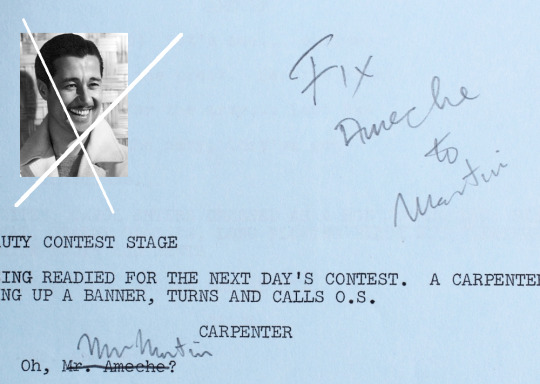
Don Ameche (David Grant aka Paul Knight Somerset) began screen acting in 1935 and was immensely popular with audiences. He had a career resurgence in 1985 when he won an Oscar for Cocoon at age 77. Ameche was supposed to be featured in 1970′s “Lucy Competes With Carol Burnett” (HL S2;E24), but he withdrew and the script was rewritten for Dean Martin, who also withdrew. The role was eventually played by Robert Alda. Consequently, this radio production is the only time Don Ameche acts opposite Lucille Ball. In 1973′s “Lucy’s Tenant” (HL S6;E7) Mary Jane says she remembers seeing a movie starring Mary Astor, Jack Oakie, and Don Ameche but the three stars were never in the same film.

Arthur Q. Bryan appeared with Lucille Ball in Look Who’s Laughing (1941). He is best remembered as the original voice of Elmer Fudd in the Warner Brothers cartoons.He also was an accomplished radio actor appearing for ten seasons as Doc Gamble on “Fibber McGee and Molly.” In 1952′s “Ricky Loses His Voice” (ILL S2;E9) he played Mr. Chambers, new owner of the Tropicana, a former vaudevillian looking to return to the stage.

Verna Felton (Aunt Lucy) made her professional stage debut at the age of 10 as ‘Little Verna Felton,’ working extensively on stage. Felton was one of the most successful performers in radio, and soon went on to television. She played the persistent Mrs. Day on “The Jack Benny Show” (1955). She memorably played Lucy Ricardo’s maid, Mrs. Porter, as well as making one other appearance on “I Love Lucy.” She received two Emmy nominations for her role in the Desilu series “December Bride,” playing Hilda Crocker from 1955 to 1959 opposite Spring Byington, who, coincidentally, was in the original film of Lucky Partners playing the role she assays here, Aunt Lucy!
Carlton Kadell (Frederick ‘Freddy’ Victor Harper III) starred as “Sky King” for ABC radio. He also was heard in the “Tarzan” serials.
Leo Cleary was primarily known as a radio performer, but did two films in 1940 with Lucille Ball: You Can’t Fool Your Wife and Dance, Girl, Dance.
Norman Field began screen acting in 1945, just a few months after this radio program first aired. On radio, he was heard in hundreds of programs, including “Chandu the Magician,” “Mystery is My Hobby” and many installments of “Lux Radio Theatre.”
Noreen Gammill was a radio performer who voiced Catty the Elephant in Walt Disney’s Dumbo. She was later on screen as a background player in “The Andy Griffith Show,” filmed at Desilu Studios.
Leona LeDoux was a radio actor in the 1940s, specializing in children's voices for such shows as, "One Man's Family," "Blondie," and "Baby Snooks." Here, she is part of a live commercial for Lux.
Eddie Marr was born on Valentine’s Day 1900 in Jersey City, New Jersey. In 1938 he was seen with Lucille Ball in The Affairs of Annabel. Along with Lucille Ball, he was in the 1966 TV special “Bob Hope: 15 of My Leading Ladies" playing Joan Caulfield’s chauffeur. He was also with Lucy in “The Bob Hope Show: Bringing Back Vaudeville” in November 1970.
Charles Seel was a former vaudevillian and radio actor who acted in early silent films. Regularly on screen after 1937, he usually played small roles such as clerks, bartenders, and shopkeepers. From 1961 to 1974 Seel was a recurring character on TV’s “Gunsmoke”.
Harry Tyler did four films with Lucille Ball from 1937 to 1950. He appeared in more episodes of “Alfred Hitchcock Presents” than any other actor.
John M. Kennedy (announcer)
ACT ONE

The episode is introduced by producer Cecil B. DeMille, who asks the audience to help pick the play and stars for the show’s tenth anniversary by submitting a postcard. He tells a story about Adolph Menjou in London that acts as a message about Lux Soap.
Our story unfolds in the Greenwich Village neighborhood of New York City with the casual meeting of David, a care-free artist (Ameche) and a girl delivering books (Ball). He wishes her “good luck” and they go their separate ways. The girl, Jean, goes home to tell her Aunt Lucy (Verna Felton) that after a man wished her good luck - she was given an expensive dress that was headed for the trash after a marital squabble.
Jean spies David on the street and rushes out to offer him a business proposition. She asks him to meet her at Nick and Nick’s, a neighborhood bar and grill.
David gets a visit from Wendell, his lawyer and friend who begs him to come back to Chicago, despite his checkered past there.
At Nick and Nick’s Jean buys the last sweepstakes ticket. She is feeling lucky because of the dress and feels David may be her good luck charm. Jean is hoping to win enough money to marry her sweetheart, an insurance salesman named Freddy. David will go in on the ticket with Jean under the proviso that she let him pay for their honeymoon, which he calls “our honeymoon.”
Angry about the “our honeymoon” insult, Jean introduces David to hot-head Freddy, her future husband, who hauls David into the back alley, presumably to avenge his sweetheart’s honor. Instead, however, they return laughing instead of bruised. David has convinced Jean that they will honeymoon as brother and sister and offers that Freddy can tag along.
Freddy holds on to the sweepstakes ticket for safekeeping. They have to figure out whether to wager it all on a horse or play it safe for a smaller cut of the winnings. David and Jean listen for the results of the race on the radio. They do not win. Freddy calls and it reveals that he sold her half of the ticket for $6,000 before the race! But he only sold her half, not David’s, who has lost it all. Jean gives David half anyway and David insists on the full terms of the agreement: to take her on a platonic honeymoon. Jean agrees to the ‘experiment’.
End of Act One.
A live commercial for Lux Soap consists of a letter from a consumer, Mrs. Willett, presented by Sally and Mrs. Kennedy.
ACT TWO
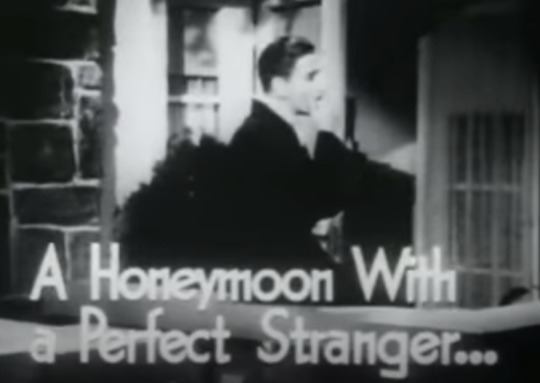
DeMille introduces the second act.
Jean and David are off on their ‘experimental honeymoon’ in a car David bought in her name. Jean wants to stop at a Western Union office to send a wire to Aunt Lucy and Freddy.
They arrive at a hotel in Niagara Falls, honeymoon capital of the world. Checking in as brother and sister, they go to their separate hotel rooms. They have breakfast together. David has sent Jean flowers. The hotel has taken it upon themselves to move them to adjoining rooms! An angry Freddy arrives to check up on his future wife. After finding no hint of misconduct, Freddy agrees to leave but is still not satisfied that everything is on the up-and-up. He checks in at a nearby hotel, asking for a 2am wake-up call.
In the evening, David calls Jean from his bedroom. He asks her to meet him in the hotel lobby and to wear her ‘lucky dress’. An older couple unknown to them asks them to join them on the terrace garden. They lead them to a bridge and the old man asks David to carry her over the bridge and to kiss her. The older couple performed the same ritual 50 years earlier and, thinking Jean and David are a romantic couple, want them to have the same happiness.
Rather than risk any further romance, Jean decides to go to bed. At 2am, Freddy loudly knocks on what he thinks is David’s door, but Jean answers it. They have swapped again so that Jean can have the room with the fireplace. Freddy uses a fire axe to get into David’s room, but he’s nowhere to be found. Freddy calls the front desk and is told David has checked out, but left a note for Jean.
Speeding away from Niagara Falls, a policeman pulls David over, who is driving the car he put in Jean’s name. They go off to find Jean to explain. End of Act Two.
Pause for station identification. During the break DeMille announces that the National Safety Council’s Colonel Stillwell (in New York) is presenting Lever Brothers and the show with an award. [Archival recordings do not present Stillwell’s remarks, just DeMille’s.]
ACT THREE
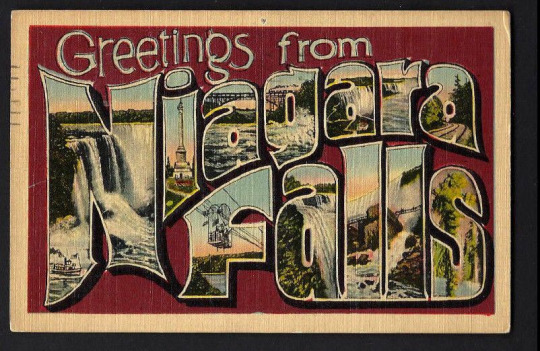
DeMille catches us up that Freddy, David, and Jean are facing a judge in a small town outside Niagara Falls. David reveals that he is really named Paul Knight Somerset. They are put in jail till the judge can make some sense of things.
Next morning, the case is tried. David’s true identity has the town abuzz. David’s lawyer and friend, Wendell is there to represent him, but is dismissed so that David / Paul can represent herself.
Aunt Lucy testifies that David gave her an expensive dress and bought the ticket. The hotel clerk testifies that David wanted adjoining rooms for illicit purposes. Freddy testifies that David’s newfound celebrity has changed his view of David. Jean takes the stand and explains the ‘experiment’. She is cross-examined by David, addressing himself as “my client”. The judge asks some questions that make David look like a scandalous womanizer.
David cross-examines himself to clarify his true intentions and feelings for Jean. It turns out that some paintings he published in a book got him sued for libel and was put in jail on principal.
The judge convicts Freddy of being a dope and destroying a hotel door with a fire axe.
The judge acquits Jean for being naïve and too trusting.
The judge is not happy with David’s record and conduct in court. Jean objects to the judge’s comments. The spectators cheer Jean’s defense of David.
The judge makes Jean and David admit that they are in love and throws the case out of court.
David and Jean are driving back to New York. He proposes a new ‘experiment’ involving a gold ring and a local justice of the peace. They are not headed to New York City after all, but to Niagara Falls! End of Play.
CURTAIN CALL
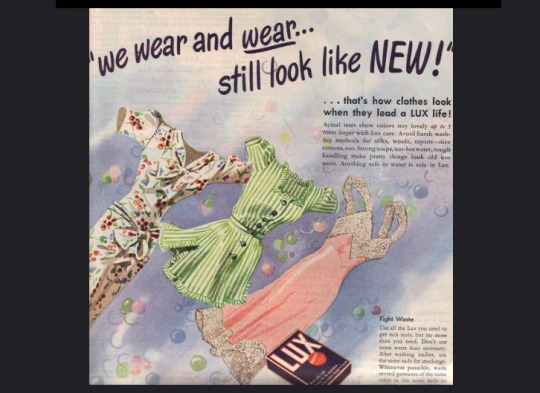
A live commercial for lux involves a little girl and mother hanging laundry on the line.
DeMille returns to talk to Lucille Ball and Don Ameche.

Lucille reveals that Don Ameche is forming his own motion picture company and making the story of Doctor Wassell starring Gary Cooper and Laraine Day. This turns out to be a disguised promotion for the 1944 film The Story of Dr. Wassell, based on the life of real-life Navy Officer, Corydon M. Wassell, directed by DeMille himself.
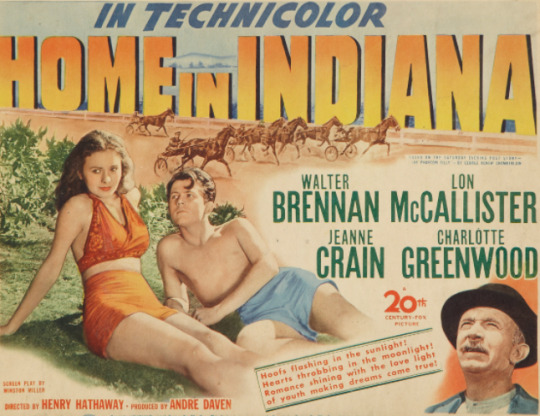
DeMille announces next week’s show will star Walter Brennan, Jeanne Crain, and Charlotte Greenwood recreating their original screen roles in Home in Indiana, a film released in July 1944. The studio audibly audience gasps!
DEMILLE: “Goodnight to you, from Holly-wood!”
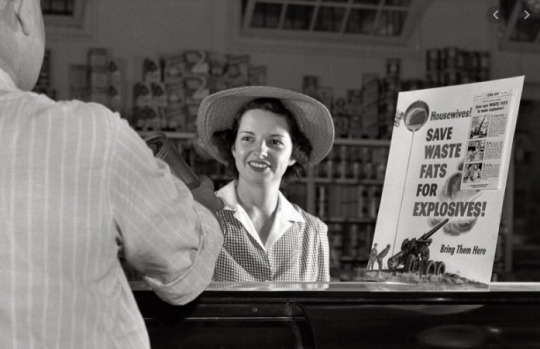
The announcer wraps up by asking consumers to save waste fats and greases to help fight the war. He reminds listeners to send in their postcards suggesting stories and stars for the tenth anniversary broadcast.

"Lucky Partners" was produced through cooperation with RKO, producers of Bride by Mistake.
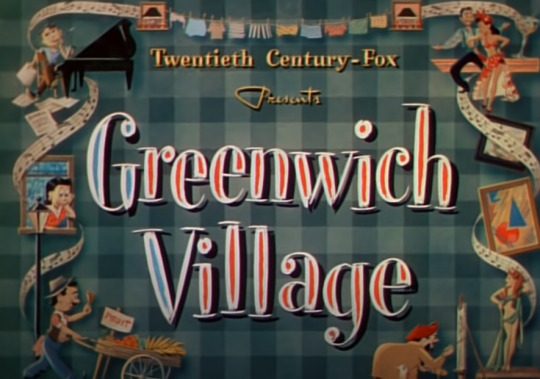
Don Ameche is mentioned as appearing in Greenwich Village, a 20th Century Fox film.

Lucille Ball appeared courtesy of MGM, producers of the Technicolor picture Kismet. Interestingly, Lucille Ball is not promoted as being in the MGM film Meet The People, which had premiered in New York City two weeks earlier and was still in release as of this broadcast.
TRIVIA

The story opens in Greenwich Village, a bastion of bohemian artists and romantics that thrived in the 1940s. It was the setting for My Sister Eileen, a 1938 book that inspired a 1940 play and 1942 film. It also was the setting of Don Ameche’s 1944 film. The above pulp novel was published in 1943.

Acting as his own lawyer, David cross-examines himself in court, something Lucy Carmichael later did in a 1964 episode of “The Lucy Show.”

Honeymoons and Niagara Falls have gone together for nearly two centuries. In a 1964 episode of “The Lucy Show,” Lucy’s daughter wants her mother to think she’s eloping so she leaves out a travel brochure for Niagara Falls!
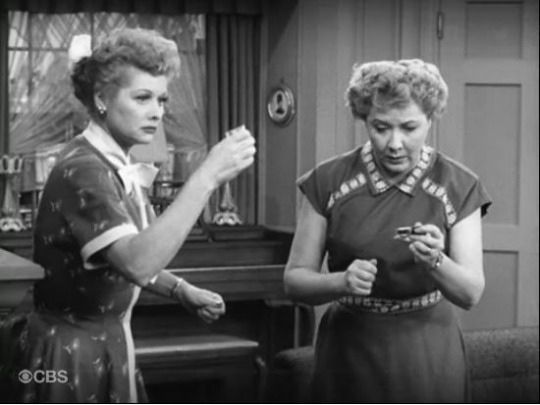
Sweepstakes were the pre-cursor to public lotteries. In the 1950s newspapers offered Lucky Buck contests, asking readers to compare serial numbers published in the newspaper with their own bills. This was the subject of “Bonus Bucks” (ILL S3;E21) in 1954, where like David and Jean, the Ricardos and Mertzes split the winnings - if they can just claim them in time!
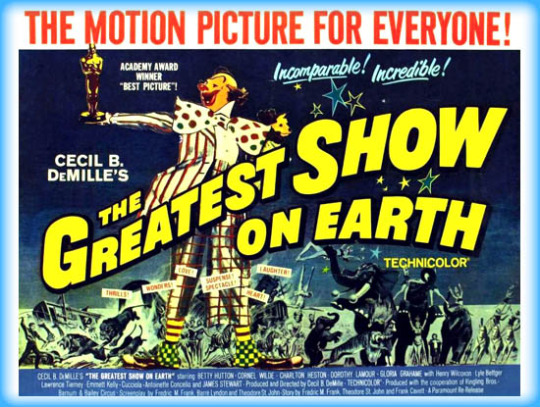
In 1949, Lucille Ball desperately wanted to do Cecil B. DeMille’s The Greatest Show on Earth, but when she asked Columbia’s Harry Cohn to loan her out to MGM, he sadistically cast her in The Magic Carpet, thinking that it was such an awful script that Ball would refuse to do it, then he could suspend her, and refuse to loan her out. Instead, Lucille called his bluff and cheerfully accepted the film, knowing that it was a quickie that would be wrapped by the time The Greatest Show on Earth started filming. Fate intervened and Lucille got pregnant with her daughter Lucie and never got to make the film. It was her husband Desi Arnaz who went into business mode and told Lucy to “grab her $85,000 fee and run.” DeMille is quoted as saying,
“Congratulations Mr. Arnaz, You are the only man to ever fuck his wife, Cecil B. DeMille, Paramount Pictures, and Harry Cohn, all at the same time.”
#Lucky Partners#Lucille Ball#Don Ameche#Lux Radio Theatre#1944#cecil b. Demille#Verna Felton#Greenwich Village#Niagara Falls#Arthur Q. Bryan#Carlton Kadell
0 notes
Text
Ep. 41: Frieda Belifante
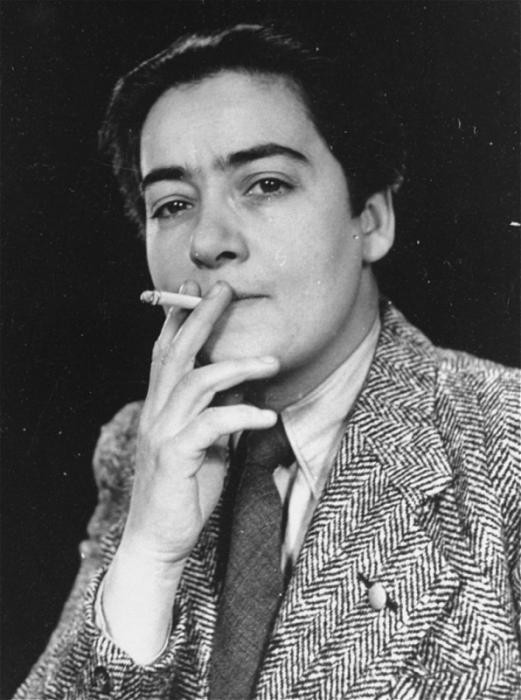
I. Early Life:
Belinfante was born into a musical family. Her father, Aron, was a prominent pianist and teacher in Amsterdam who held the distinction of being the first pianist to present the entire cycle of Beethoven piano sonatas during a single season in the Amsterdam Concertgebouw.
She started learning the cello at age 10 and then made her professional debut in the Amsterdam Concertgebouw assisted by her father- which is concert hall in Dutch and is considered to be one of the first in the world.
In her professional she managed and conducted HS, college and professional ensembles before becoming the first woman the manage the Concertgebouw or manage any professional concert hall in 1937 -1941.
She was so good she was even asked to go to a prestigious masters class for conduction in Switzerland and then won 1st prize over 12 other male conductors there! FEMINISIM!!!
II. Resistance:
SO again, she befriends William Arondeus who was actually the leader if the Raad van Verzet (Resistance Council) - and they both take part in the CKC resistance forging those documents which ultimately leads to them bombing of the Amsterdam Civil Registry Office.
SO - when the Gestaop starts following the members of the CKC due to the bombing - girl immediately goes into hiding but 13 men including William are ratted out and executed.
SO - Bad Bitch Belinfante disguise herself as a boy for 3 months and then was helped by the resistance to cross over to Belgium then France where the French underground helped her make her way to Switzerland!
Things were so bad by this time that when her and her travel partner reached the Swizz ALps in the winter of 1944 they had to cross the Alps on foot in order to get into the country!!!!!!!! IN THE MIDDLE OF FUCKING WINTER!!!!!!!!!!!
iN sWITZERLAND - Her former teacher Hermann Scherchen saved her from being sent back over the border by verifying that she was a Dutch citizen and his former pupil. She was then given refugee status and was able to return to the Netherlands when the war was over.
III. After the War:
Belinfante emigrated to the United States in 1947, eventually settling in Laguna Beach, California and joining the music faculty of UCLA in 1949.
She the formed the Vine Street Players which proved fortuitous for her as it prompted local civic and cultural leaders to invite Belinfante to form a permanent orchestral ensemble in Orange County thus becoming the founding artistic director and conductor of the inaugural Orange County Philharmonic Society - the first such ensemble in Orange County (1954).
Belinfante's involvement with the Orange County Philharmonic came to an abrupt end in 1962 when her contract was not renewed - She later stated publiclay in 1994 that she believed gossip about her sexual orientation was the real reason for this - as it was originally played off as a money thing and that appointing a man would bring in more revenue.
Belinfante continued her music and even became a famous booking agent in Laguna Beach.
Belinfante summed up her career in a Los Angeles Times interview: "It was just too early for me. I should be born again. I could have done more, that's what saddens me. But I'm not an unhappy person. I look for the next thing to do. There's always something still to do."
In her later years of life was was recognized numerous times for her musical talents and her bravery in the war.
There is even a documentary about her But I Was a Girl" (1999)
The United States Holocaust museum recognized her for her resistance
Her story was also featured in an exhibition, funded by the Dutch government, about the persecution of gays and lesbians during the Second World War.
0 notes